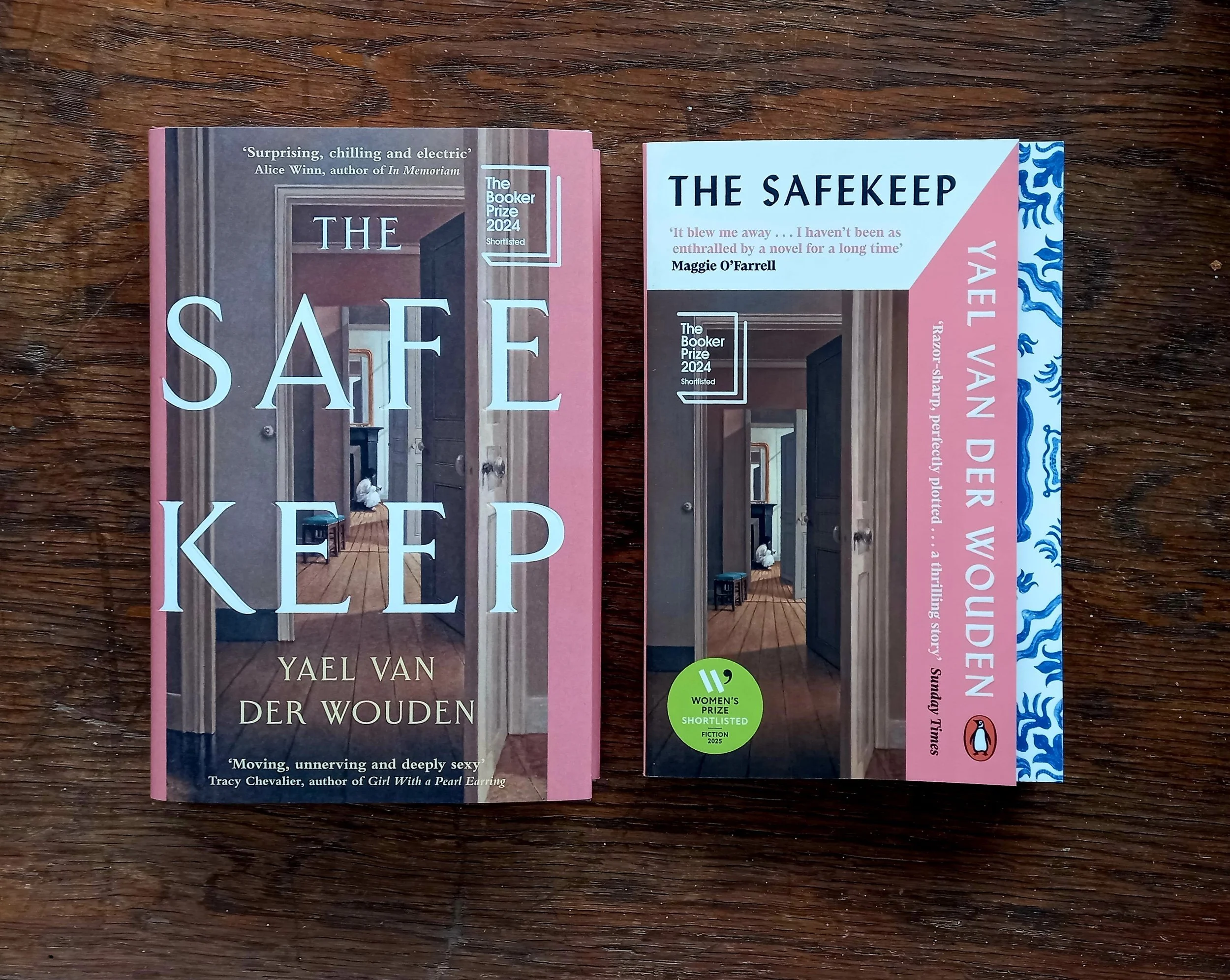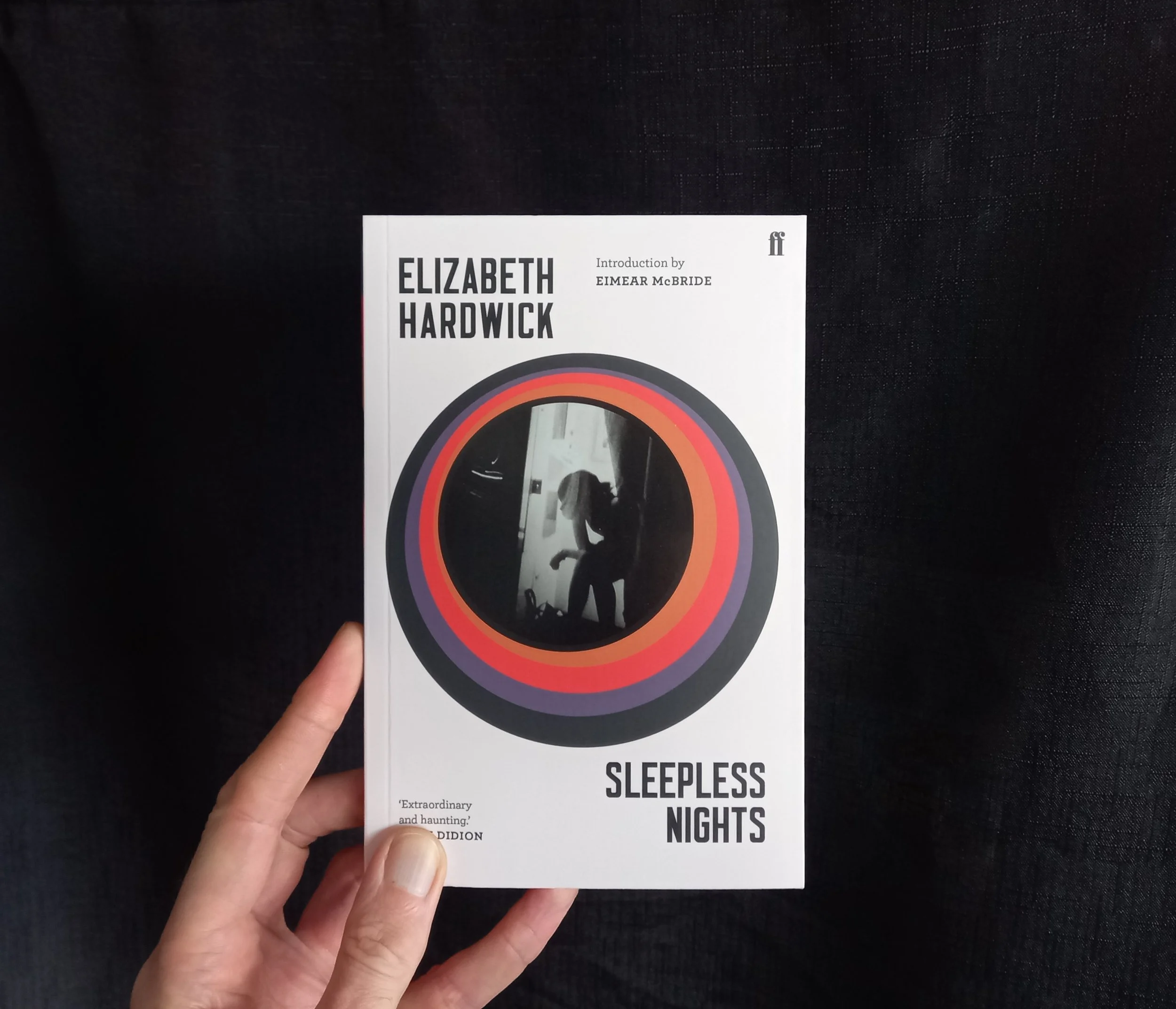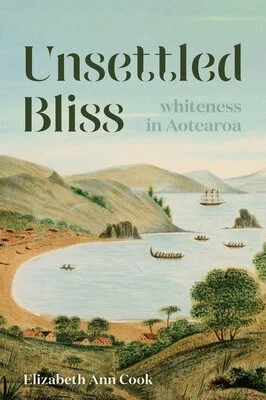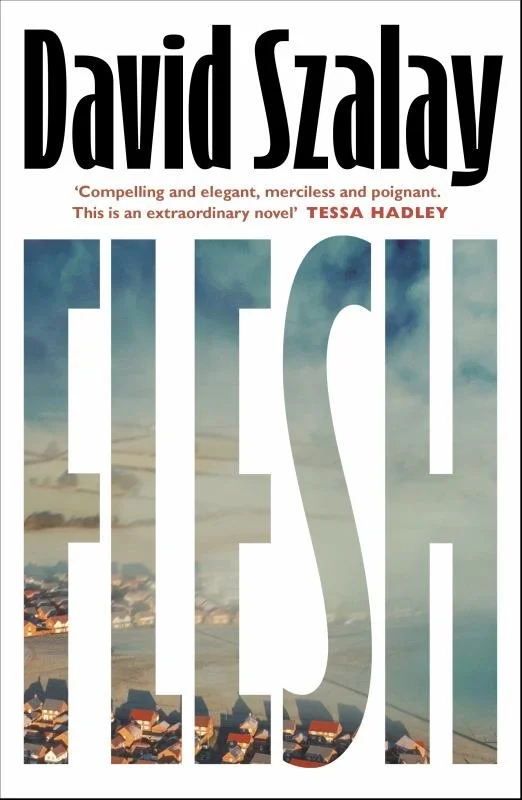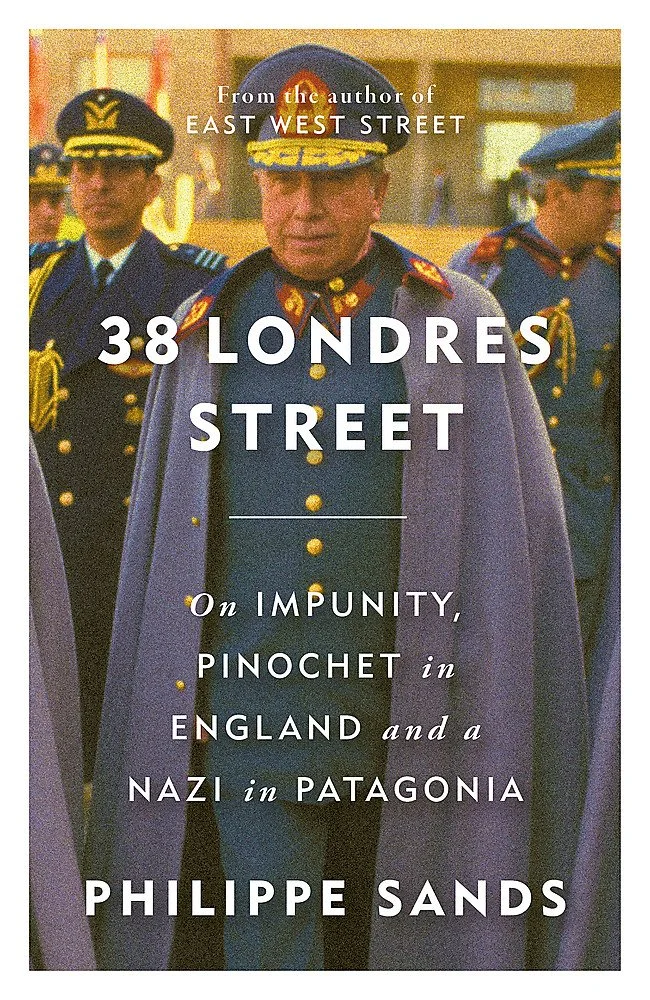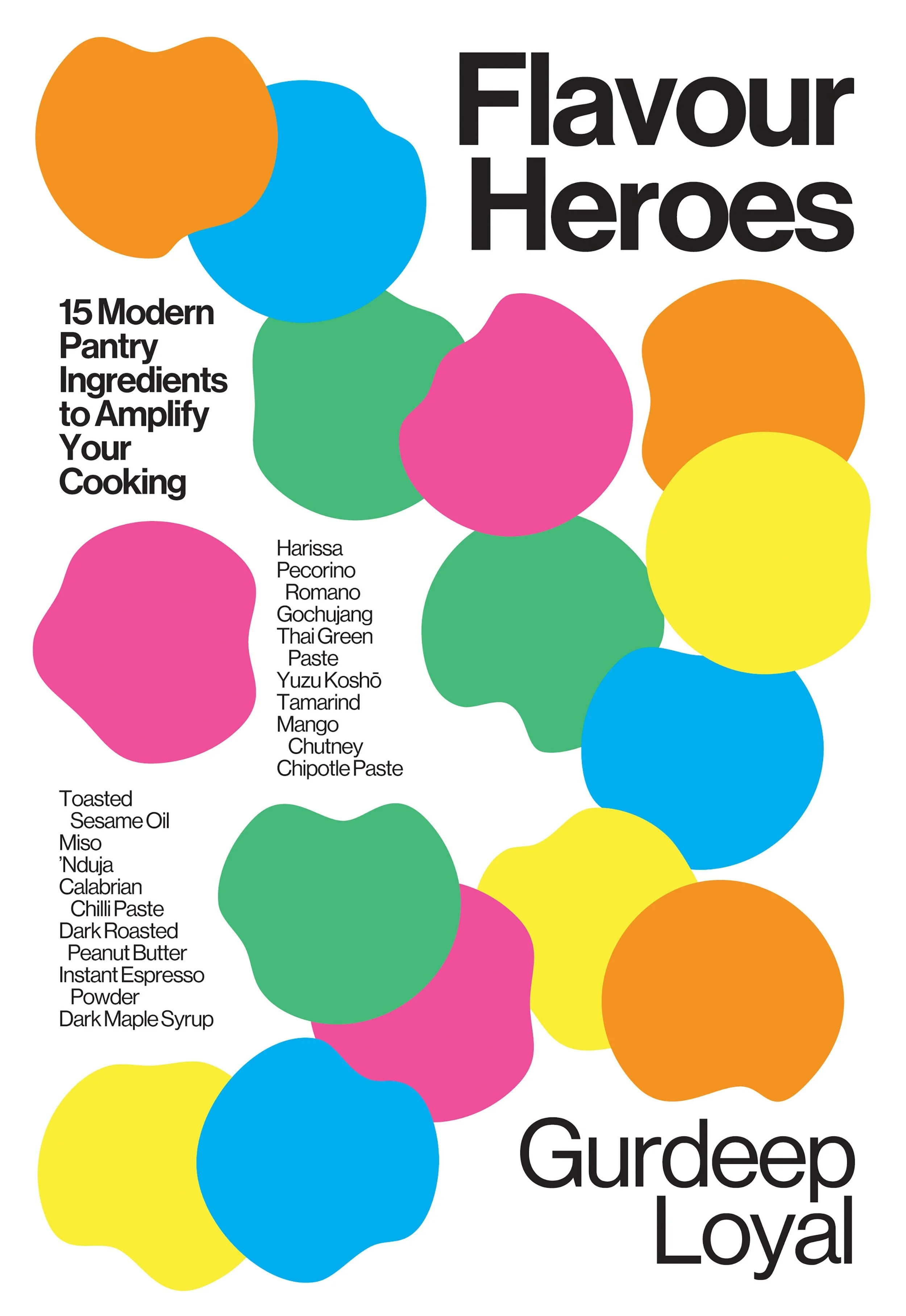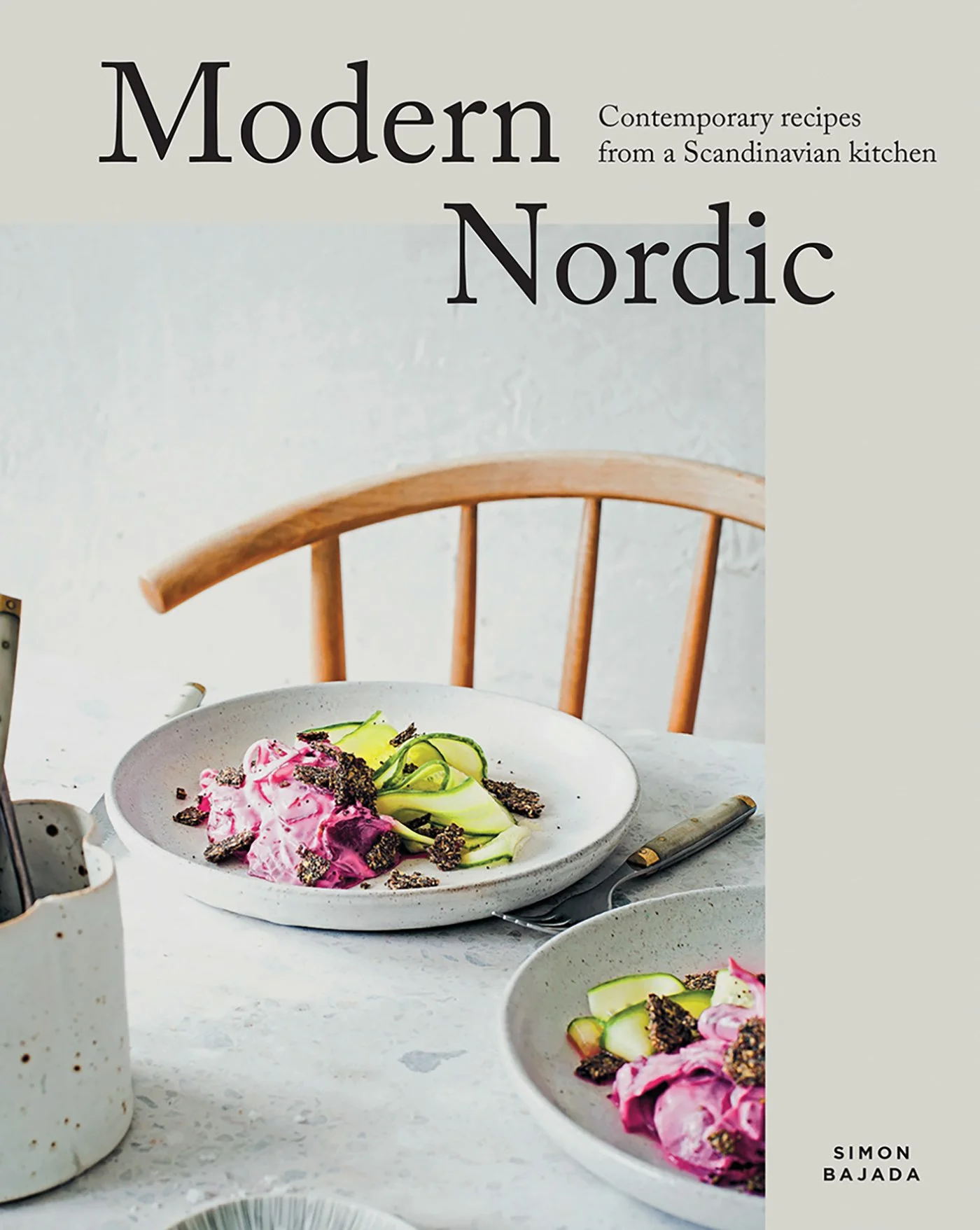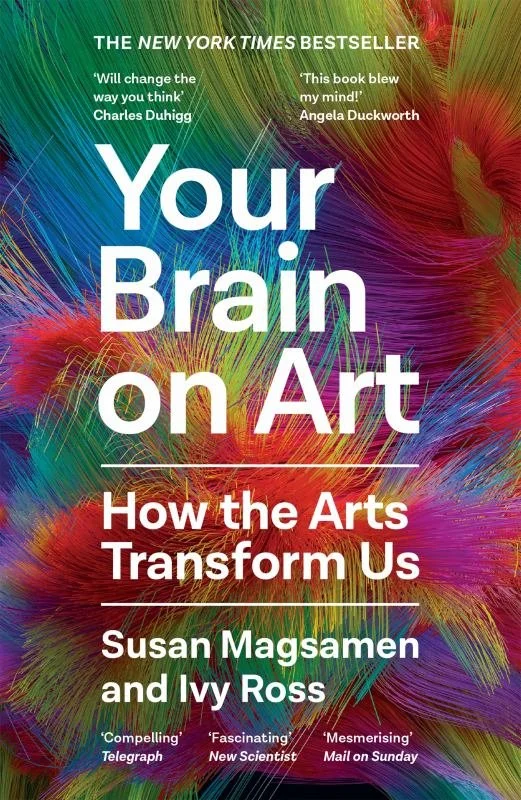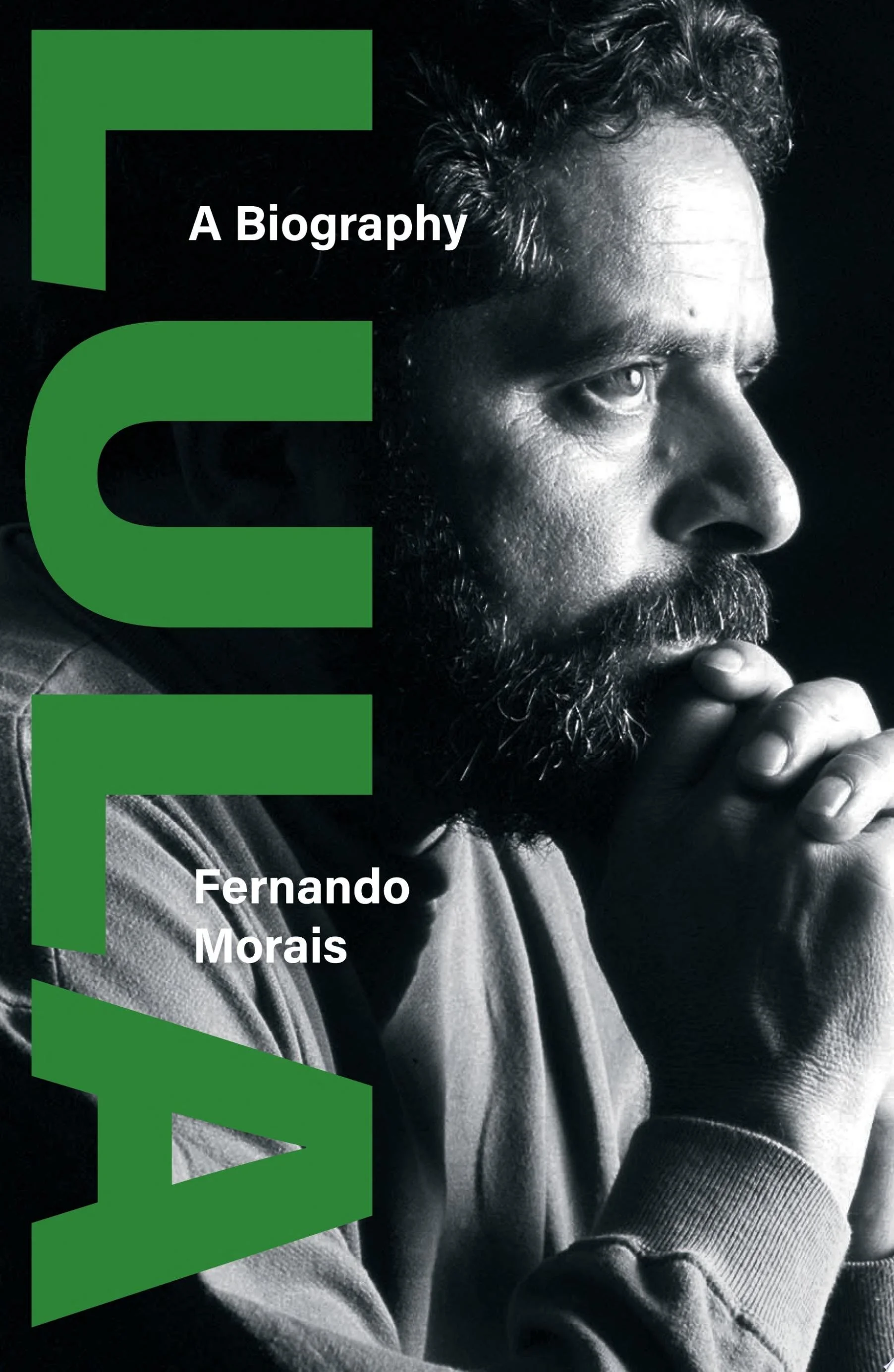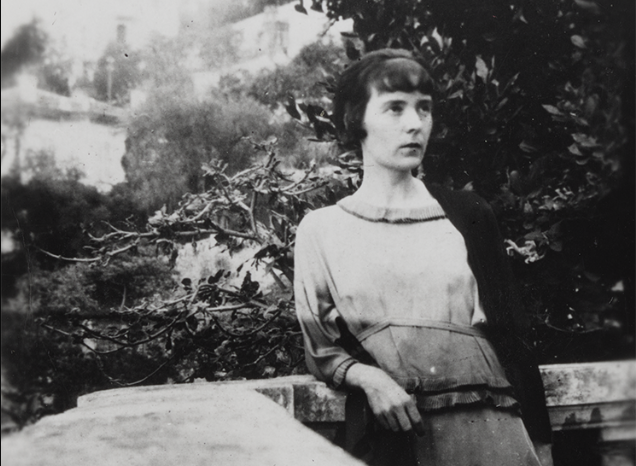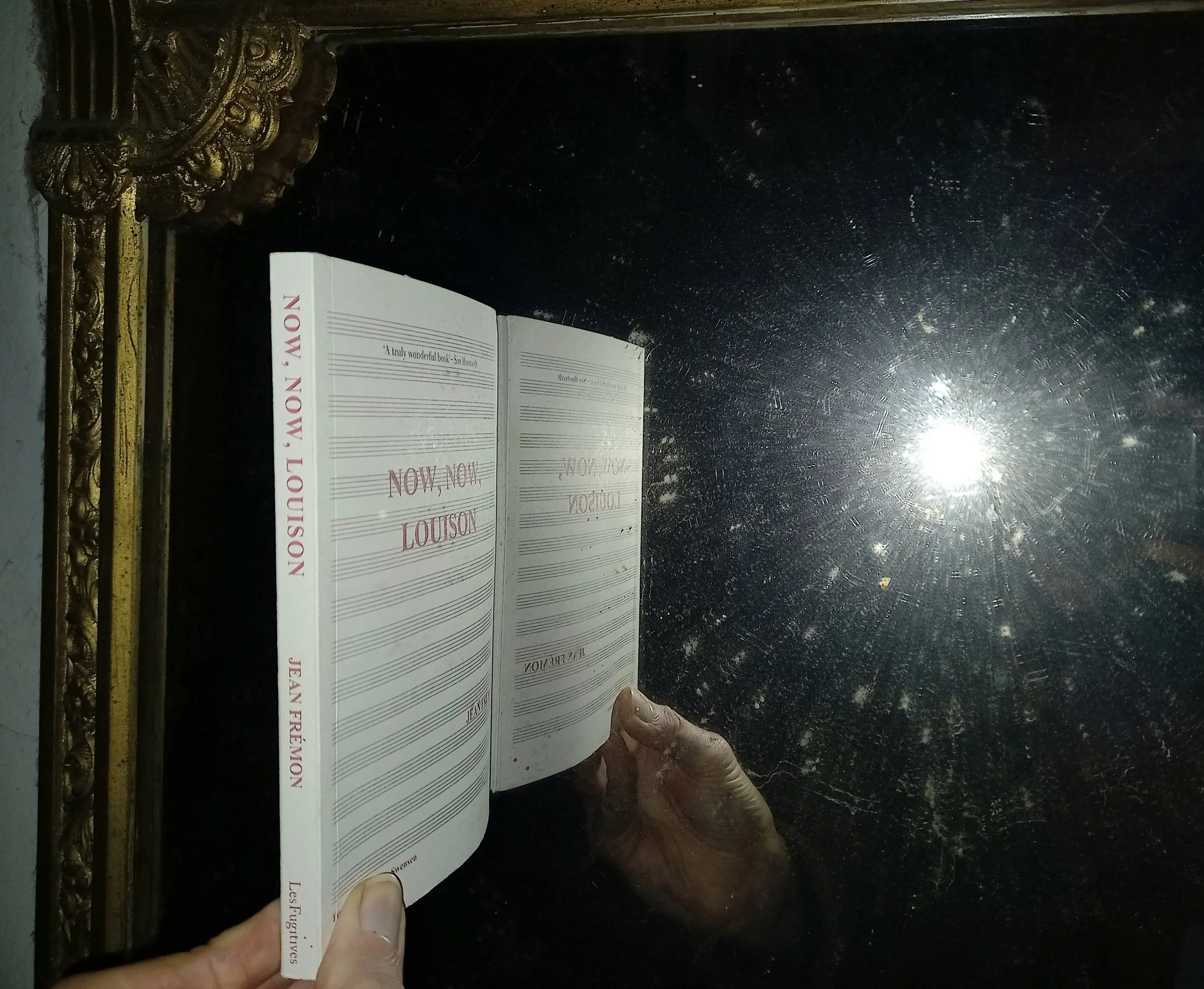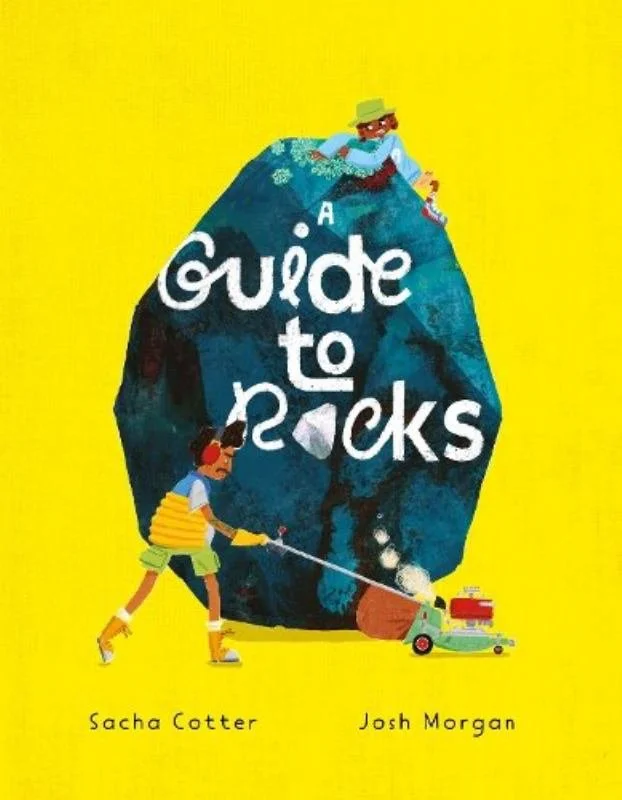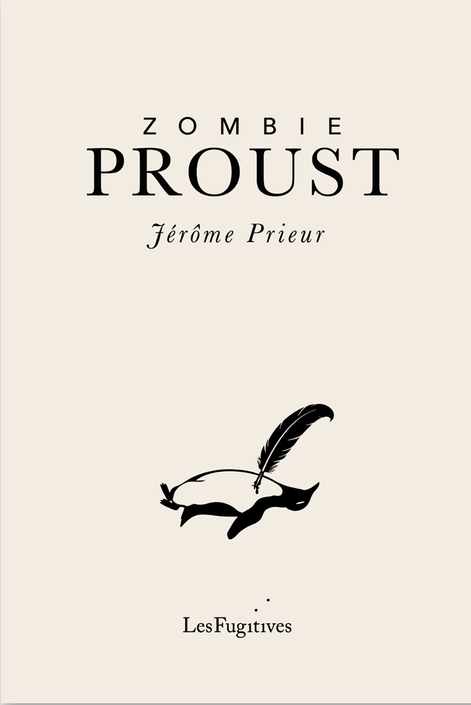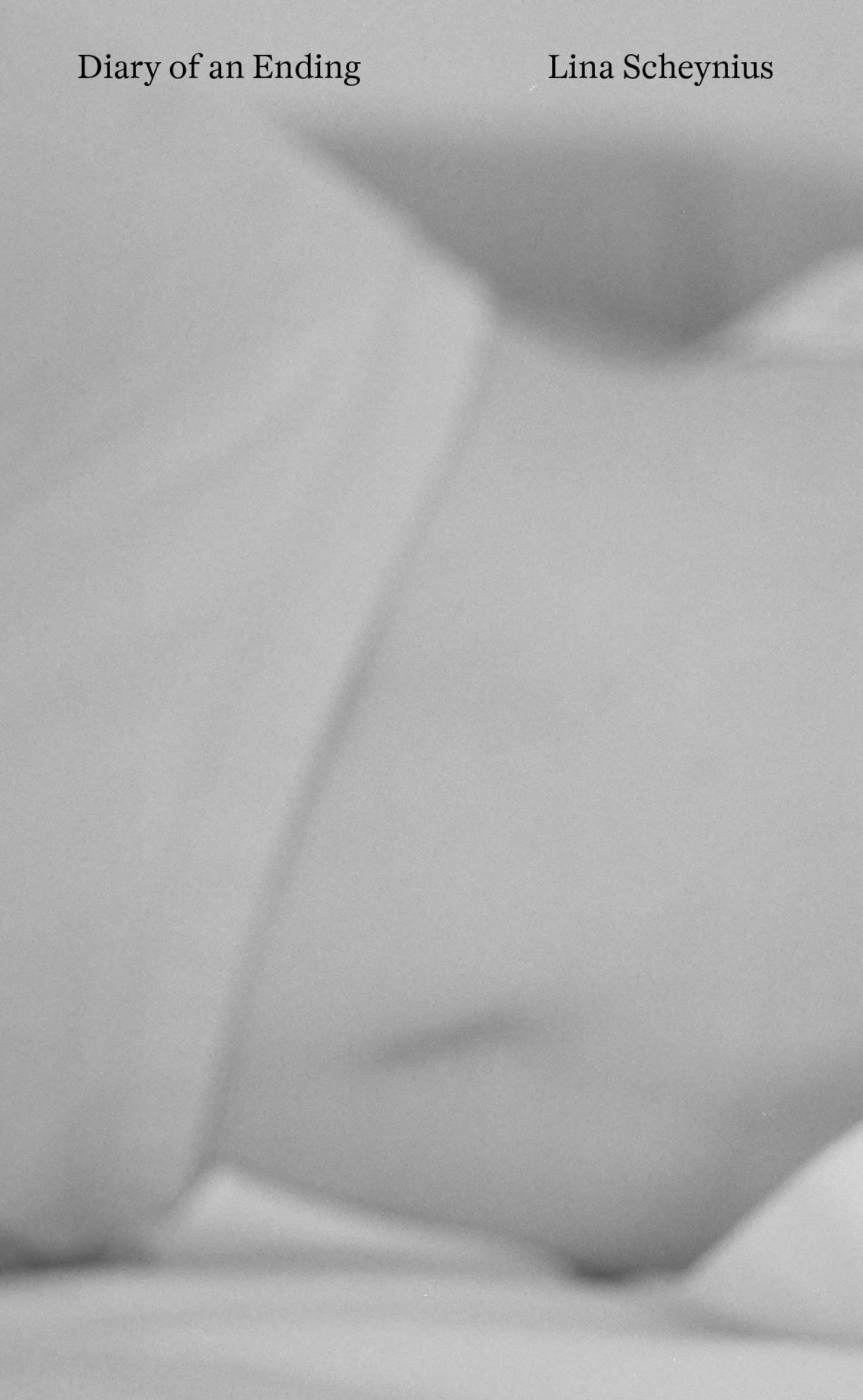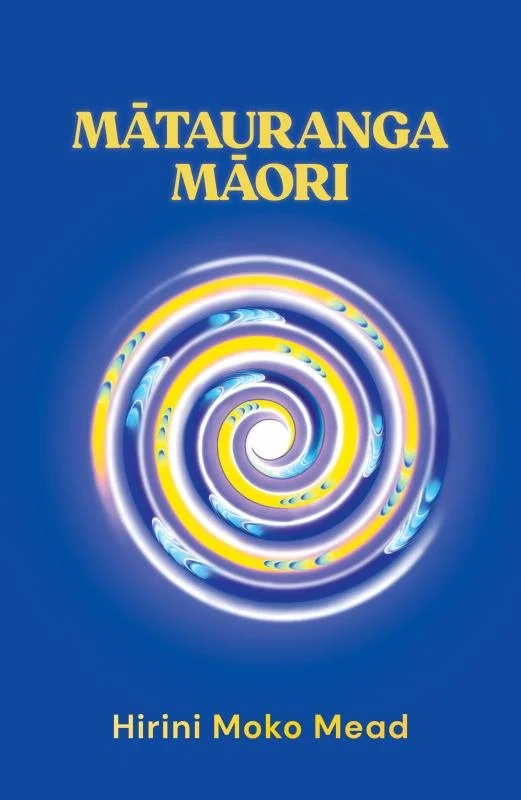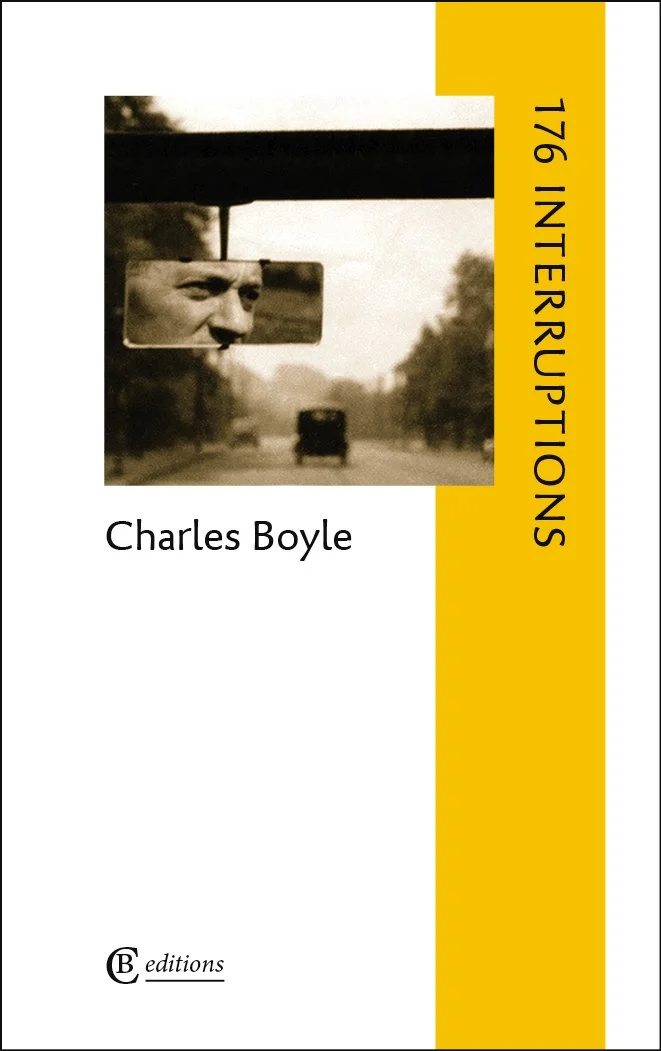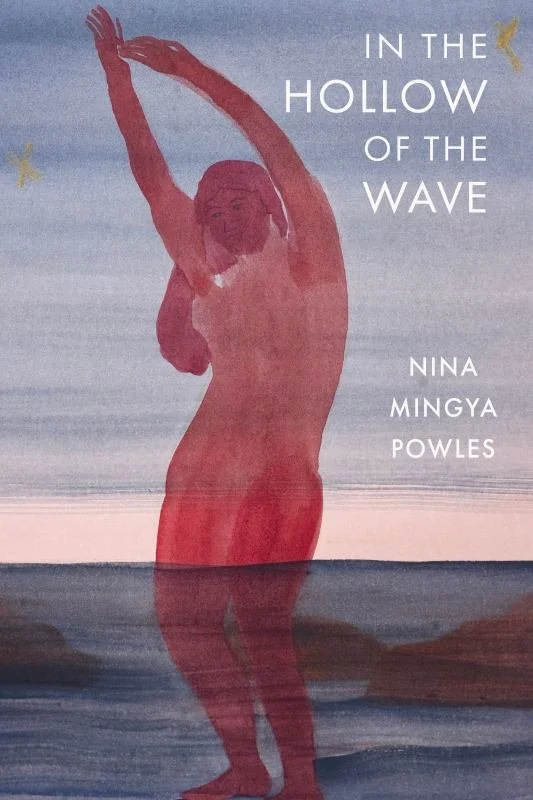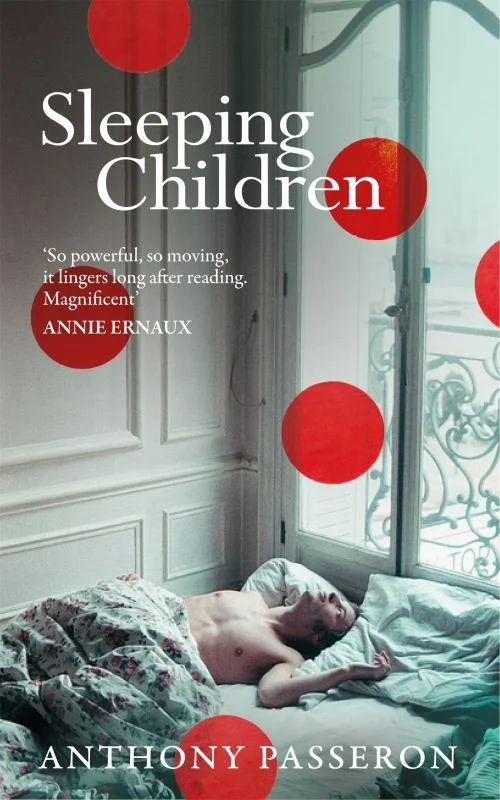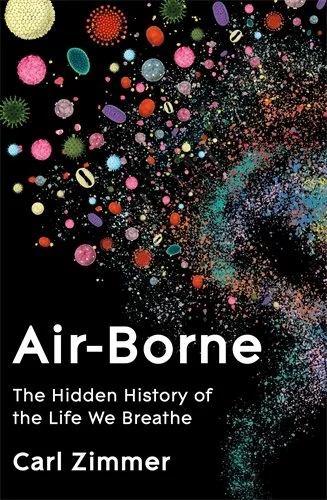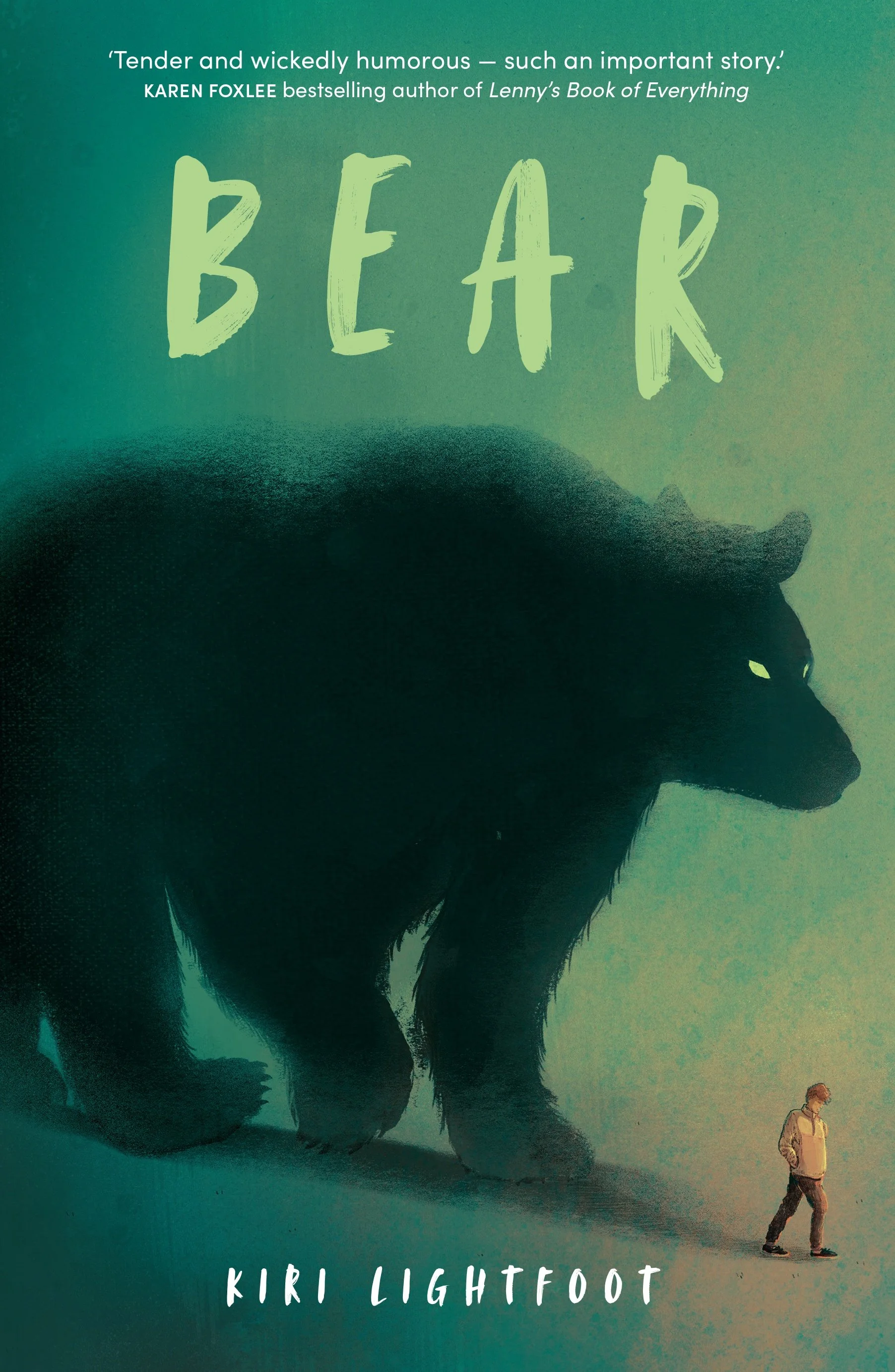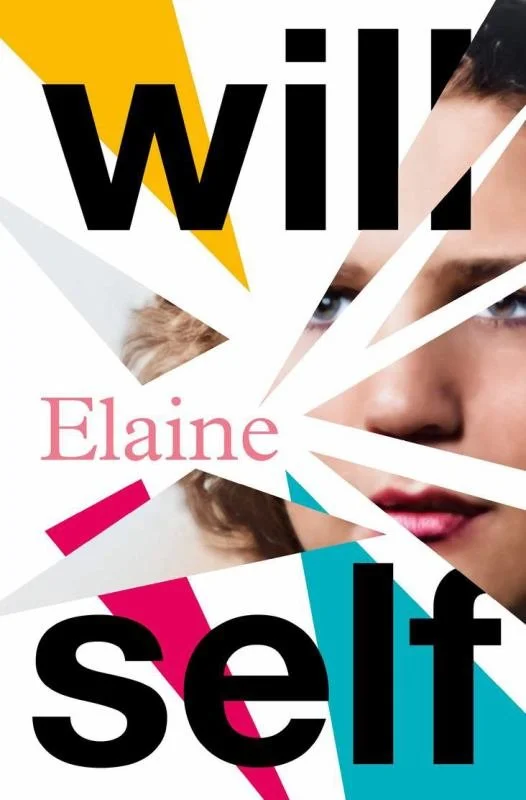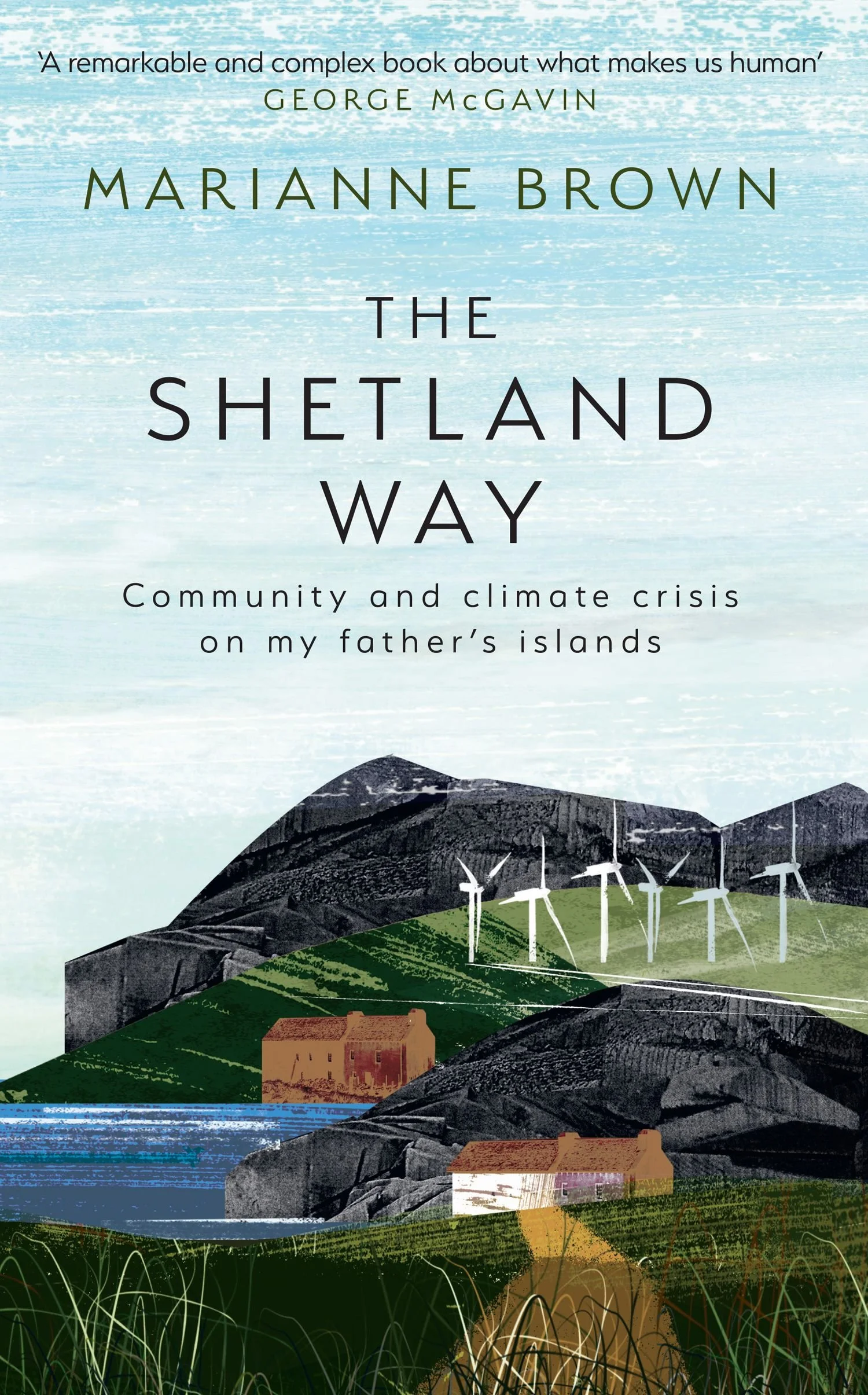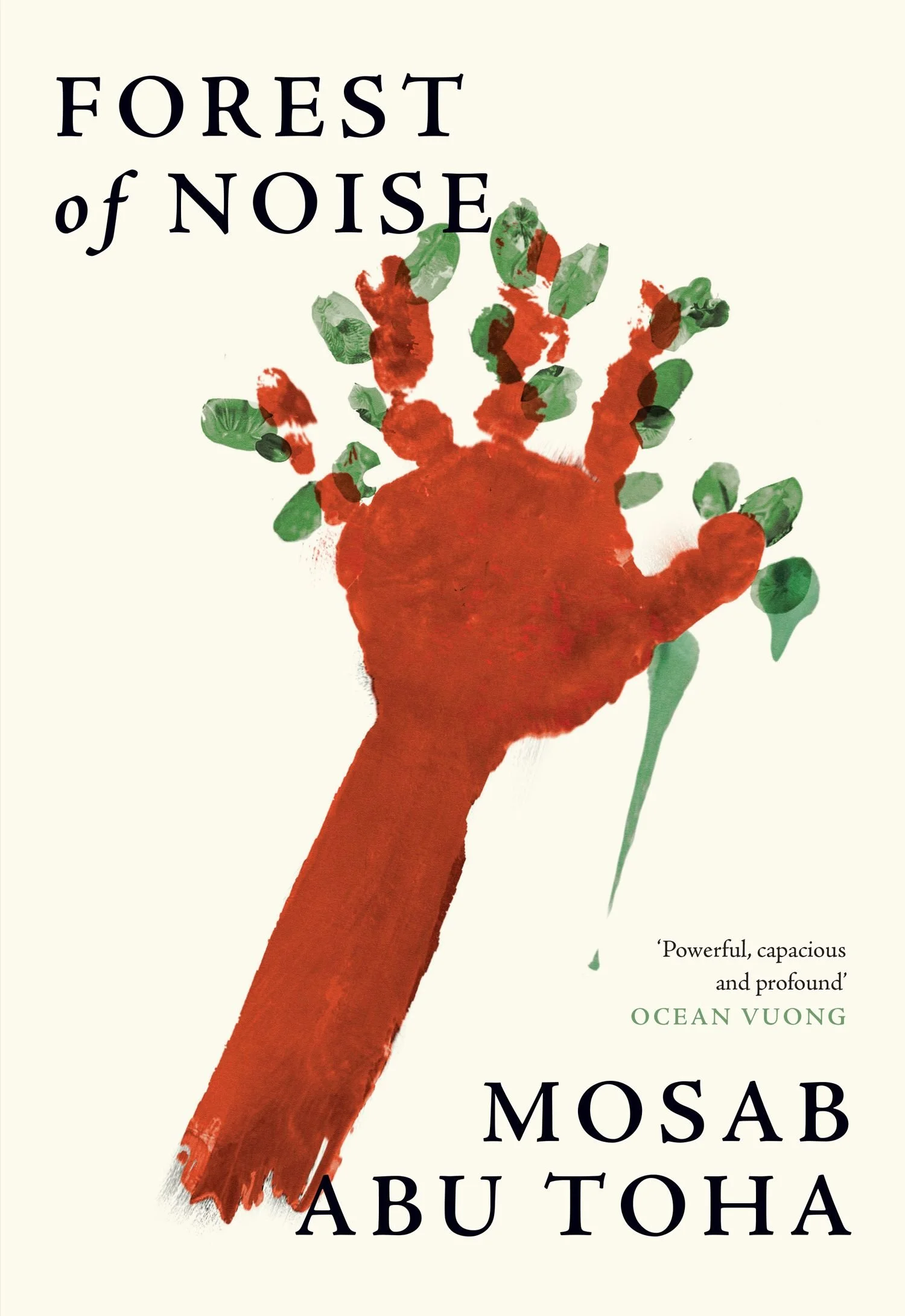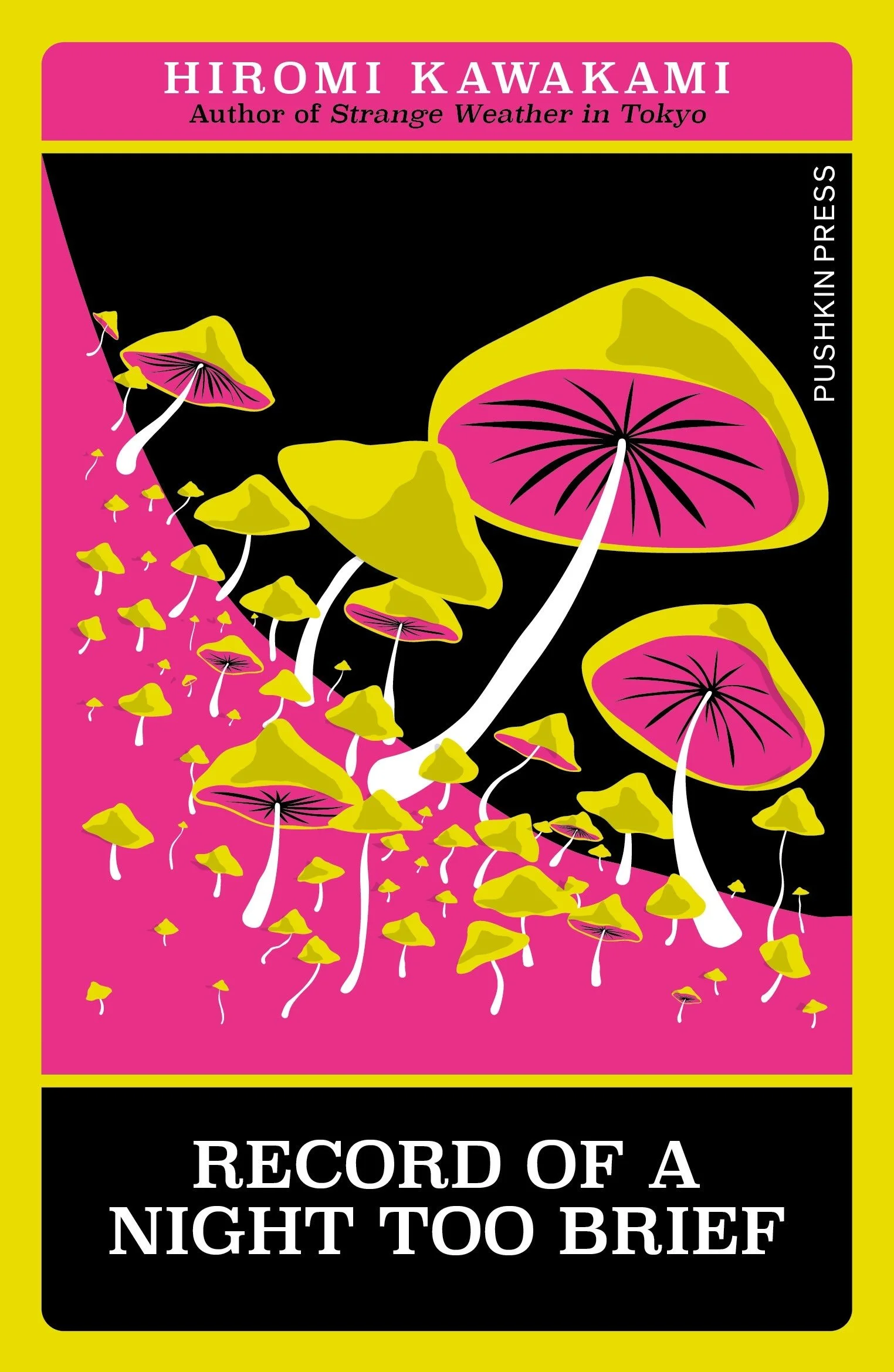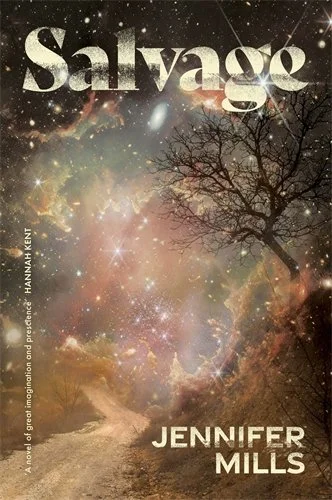A study in the workings of siblings, a story of love, revenge and desire entangled, and a house at its centre. The Safekeep is a stunning debut. Shortlisted for the International Booker Prize, author Yael van der Wouden eases us into 1961 Holland, looking to the future, but curtailed by the past. This novel keenly observes intimate relationships, social mores, the impact of war, and how these traumas influence decisions.
Isabel is living alone in the family home. Her brothers have both long departed for the city, each to shape their own lives, leaving their sister to care for, and then nurse their mother. Now in her mid-20s, Isabel strictly keeps the house in order, and herself in order. She’s a woman set in her ways, conservative and judgemental, repressed. Yet not everything is as it seems. There’s a broken piece of crockery in the garden from the ‘hare set’, but none of those plates have been broken in Isabel’s memory. It has a story to tell, but whose story? Isabel’s life in the small rural community is predictable. It is calm and pleasant. Yet you sense an uneasiness, a slight tremble in Isabel’s resolve and reserve, a sense of wanting. It is as if Isabel is waiting for something to happen, but she’s not sure what to wish for. And then the disruptor arrives. Eva, the most recent girlfriend of brother Louis, is coming to stay. She has nowhere to go. As Louis leaves for a work trip, the tension between Isabel and Eva grows. Isabel is convinced that Eva is after Louis for his money and his claim to the house as the oldest. She stiffens at Eva’s voice, her tread in the house, at her insistence of staying in Mother’s Room. Isabel counts the silverware and makes an inventory. Eva blows hot and cold, she laughs at Isabel’s ways and equally grows angry at her for her accusations. Despite the animosity, something is drawing them together. They recognise, in each other, a desire for change, for someone to see the other, to really notice them. As the barriers break down between the two women, and Isabel throws caution to the wind, desire takes them to a place apart from the others and their pasts, and they are enveloped in each other and by the house. But it is the house and its contents that will be their undoing. Isabel’s suspicions are founded. There are so many items missing. But why? The Safekeep is a story of reparation, of guilt and loss, and of finding love and truth even when it is difficult to accept.
Lucy Mangan grew up with her nose in a book. Bookish charts her passage through a book-lined adolescence — when so much is recalibrated, including our reading — and into the wide, crowded shelves of the adult world. There is so much to recognise as (very like) your own experience in this enjoyable book — it covers everything from school set texts to the hoarding impulse, from realism to romance, from choosing novels to choosing lovers, from old favourites to new babies, from books as entry-points to the worlds of others to books as exit-points from a world that is sometimes too much. Mangan finds resonances between reading and ‘life’ at every turn, and the reader will find these resonances on every page. This book will help you love your bookcase, your bookshop, and your fellow readers more than ever.
“Fact is to me a hindrance to memory,” writes the narrator in this remarkable collage of passages evoking the ways in which past experiences have impressed themselves indelibly upon her. The sleepless nights of the title are not so much those of the narrator’s youth, though these are either well documented or implied and so the title is not not about them, but those of her present life, supposedly as “a broken old woman in a squalid nursing home”, waking in the night “to address myself to B. and D. and C.— those whom I dare not ring up until morning and yet must talk to through the night.” As if the narrator is a projection of the author herself, cast forward upon some distorting screen, the ten parts of the book make no distinction between verifiable biographical facts and the efflorescence of stories that arise in the author’s mind as supplementary to those facts, or in substitution for them. Elizabeth the narrator seems almost aware of the precarity of her role, and of her identity as distinct from but overlapping that of the author: “I will do this work of transformed and even distorted memory and lead this life, the one I am leading today.” Hardwick writes mind-woundingly beautiful sentences, many-commaed, building ecstatically, at once patient and careening, towards a point at which pain and beauty, memory and invention, self and other are indistinguishable. Spanning over fifty years, the book, the exquisite narrowness of focus of which is kept immediate by the exclusion of summary, frame or context, records the marks remaining upon the narrator of those persons, events or situations from her past that have not yet been replaced, or not yet been able to be replaced, by the ersatz experiences of stories about those persons, events and situations. “My father…is out, because I can see him only as a character in literature, already recorded.” Hardwick and her narrator are aware that one of the functions of stories is to replace and vitiate experience (“It may be yours, but the house, the furniture, strain toward the universal and it will soon read like a stage direction”), and she/she writes effectively in opposition to this function. Observation brings the narrator too close to what she observes, she becomes those things, is marked by them, passes these marks on to us in sentences full of surprising particularity, resisting the pull towards generalisation, the gravitational pull of cliches, the lazy engines of bad fiction. Many of Hardwick’s passages are unforgettable for an uncomfortable vividness of description—in other words, of awareness—accompanied by a slight consequent irritation, for how else can she—or we—react to such uninvited intensity of experience? Is she, by writing it, defending herself from, for example, her overwhelming awareness of the awful men who share her carriage in the Canadian train journey related in the first part, is she mercilessly inflicting this experience upon us, knowing it will mark us just as surely as if we had had the experience ourselves, or is there a way in which razor-sharp, well-wielded words enable both writer and reader to at once both recognise and somehow overcome the awfulness of others (Rachel Cusk here springs to mind in comparison)? In relating the lives of people encountered in the course of her life, the narrator often withdraws to a position of uncertain agency within the narration, an observatory distance, but surprises us by popping up from time to time when forgotten, sometimes as part of a ‘we’ of uncertain composition, uncertain, that is, as to whether it includes a historic ‘you’ that has been addressed by the whole composition without our realising, or whether the other part of we is a third person, indicating, perhaps, that the narrator has been addressing us remotely all along, after all. All this is secondary, however, to the sentences that enter us like needles: “The present summer now. One too many with the gulls, the cry of small boats on the strain, the soiled sea, the sick calm.”
At first I was concerned about the title of this book, as a cat is not operated by anyone (except themself), but then I realised that this is all part of the project: the clever conceit of the title will make humans get this book, which will then go on to help them to treat cats with the respect and understanding that they deserve, to give cats both the right kinds of attention and sufficient space to exercise their necessary independence. The book is a mixture of good information and ‘relatability’, and its parodic presentation in the form of an appliance manual continues to be amusing and appealing throughout. I read this over Thomas’s shoulder last night. He would recommend it for anyone who likes a cat, and I would too. I even got a few ideas myself. The ‘Precious gifts’ floorplan on page 79 inspired me to leave a nice vomit in the kitchen for Stella to stand in this morning — not something that I do very often. All cats, or anyway all cat ‘operators’, should come with a copy of The Cat Owner’s Manual.
All your choices will be good. Click through to our website to secure your copies. Books can be sent by overnight courier or collected from our door.
Call Me Ishmaelle by Xiaolu Guo $38
”I must work on a ship as a man... Yes, I must seek a new life, more adventurous than that of my fellows on this desolate salt marsh. I must find freedom on the seas.” 1843. Ishmaelle is born in a small village on the stormy Kent coast where she grows up swimming with dolphins. After her parents and infant sister die, her brother, Joseph, leaves to find work as a sailor. Abandoned and desperate for a life at sea, Ishmaelle disguises herself as a cabin boy and travels to New York. Call Me Ishmaelle reimagines the epic battle between man and nature in Herman Melville's Moby-Dick from a female perspective. As the American Civil War breaks out in 1861, Ishmaelle boards the Nimrod, a whaling ship led by the obsessive Captain Seneca, a Black free man of heroic stature who is haunted by a tragic past. Here, she finds protectors in Polynesian harpooner, Kauri, and Taoist monk, Muzi, whose readings of the I-Ching guide their quest. Through the bloody male violence of whaling, and the unveiling of her feminine identity, Ishmaelle realises there is a mysterious bond between herself and the mythical white whale, Moby Dick. Xiaolu Guo has crafted a feminist narrative that stands alongside the original while offering a powerful exploration of nature, gender and human purpose. [Paperback]
”A brilliantly written reordering of Moby-Dick, ambitious, brave, and strange, from the imagination of this natural-born storyteller. There's a cinematic, global sweep to its motion, and an unbridled energy and poetry to its dramatic words.” —Philip Hoare
>>Write less in order to write stronger.
Unsettled Bliss: Whiteness in Aotearoa by Elizabeth Ann Cook $40
If you do not know the history of Aotearoa after the 1835 Declaration of Independence and Te Tiriti o Waitangi 1840, Unsettled Bliss offers a clear explanation of settler occupation, its impact on indigenous land in Aotearoa, and the lasting consequences. However, it goes beyond that. This book enables you to understand what drove people to act as they did — and what continues to shape our society today. Unsettled Bliss challenges you to reflect on your place in the society of Aotearoa. It pulls no punches. For many, it will be an awakening — an unflinching look at how racism operates in our everyday lives, within our whānau, workplaces, and institutions. If you seek to deepen your understanding of social issues, wealth disparity, and political structures, this book is essential reading. A landmark comprehensive examination of the system and ideology of whiteness in Aotearoa. [Paperback]
Flesh by David Szalay $38
Fifteen-year-old Istvan lives with his mother in a quiet apartment complex in Hungary. New to the town and shy, he is unfamiliar with the social rituals at school and soon becomes isolated, with his neighbour — a married woman close to his mother's age — as his only companion. These encounters shift into a clandestine relationship that Istvan himself can barely understand, and his life soon spirals out of control. As the years pass, he is carried gradually upwards on the currents of the twenty-first century's tides of money and power, moving from the army to the company of London's super-rich, with his own competing impulses for love, intimacy, status and wealth winning him unimaginable riches, until they threaten to undo him completely. [Paperback]
”Flesh is at once intricate and spacious, it flows both fast and deep. There's brilliance on every page. Szalay is an ingenious conductor of time, and of the fates and forces that give shape to a life.” —Samantha Harvey
”This is a marvellous novel. Compelling and elegant, merciless and poignant. David Szalay is an extraordinary writer.” —Tessa Hadley
”In Istvan David Szalay has created a modern existential antihero in the grand tradition of Camus and Dostoevsky. Amid the random accidents and desultory decisions that shape his life, and come to feel like fate, he is at once a cool observer and a towering presence. Taut, spare and perfectly structured, Flesh reads like a gripping thriller which slowly gathers to itself the emotional power of classical tragedy.” —Carys Davies
Towards Modernism: The Walter Cook Collection at Te Papa by Justine Olsen $75
A treasure trove of design, The Walter C Cook Collection of Decorative Arts is one of the treasures of Te Papa. Built up over a twenty-five-year period by Walter Cook, a discerning and determined collector of modest means, its glass, ceramic and metal objects track the evolution of design from the Arts and Crafts movement through to the British and European modernism of the 1970s. The world's leading designers — William Morris, Christopher Dresser, Archibald Knox, William Moorcroft, Frank Brangwyn, Charles Noke, Gladys Rodgers, Truda Carter, Susie Cooper, Keith Murray, Stig Lindberg, Berte Jessen, Carl-Harry Stålhane and so many more — all feature in its pages. Illustrated with over 300 objects, from art pottery to Danish design, this book showcases the stars of the collection while offering an engaging short course in design history. [Flexibound with wrapper]
>>Look inside!
Sunbirth by An Yu $38
As the sun starts slowly disappearing, the residents of a remote town in the desert find themselves undergoing shocking transformations. In Five Poems Lake, a small village surrounded by impenetrable deserts, the sun is slowly disappearing overhead. A young woman keeps an apprehensive eye on the sky above as she tends her family's pharmacy of traditional medicine. She has few customers, and even fewer visitors. Her father was found dead by the lake twelve years ago, in unexplained circumstances. Her elder sister, Dong Ji, works at a wellness parlour across town for those who can afford it — which, during these strange and difficult days, is not many. The town fell on hard times long before the sun began to shrink, but now, every few days, a new sliver disappears. As the temperature drops and the lake freezes over, the inhabitants of the town realise that there is no way they can survive. But when the Beacons appear — ordinary people with heads replaced by searing, blinding light, like miniature suns - the residents wonder if they may hold the answer to their salvation, or if they are just another sign of impending ruin. Soon, Dong Ji and her sister will uncover a photograph which may offer a clue in the mystery of the Beacons, and finally help them learn what happened to their father. [Paperback]
38 Londres Street: On impunity, Pinochet in England, and a Nazi in Patagonia by Philippe Sands $40
In the heart of Santiago, the infamous 38 Londres Street becomes the haunting backdrop for a riveting tale that intertwines the arrest of Augusto Pinochet in London, the post-war life of senior SS officer Walther Rauff in Chilean Patagonia and the sinister connections between the two men. Rauff, responsible for the wartime horrors of mobile gas vans, flees justice after the war and finds an unlikely refuge in Chile. Settling in Punta Arenas, he manages a king crab cannery, seemingly far removed from his dark past. But as rumours swirl about Rauff's involvement with Pinochet's secret intelligence services and the disappearances that plagued Chile, a chilling narrative unfolds. In 1998, as Pinochet faces arrest in London, Philippe Sands is approached to advise the dictator but instead chooses to act as a barrister for Human Rights Watch. This decision leads to an eight-year exploration into Rauff's second life, his ties to Pinochet and his role in the atrocities at the heart of the London proceedings. Through a unique blend of memoir, detective story, courtroom drama and travelogue, drawing on interviews with key players and extensive research in archives worldwide, Sands unveils a hidden double story of mass murder and a disturbing link between the atrocities of the 1940s and those of our own times. [Paperback]
”Sands's achievement is to excavate a deeper intimacy between the cases of Rauff and Pinochet. He follows each twist in the double narrative with an impressive combination of moral clarity and judicious detachment. But it is Sands's expertise in international law, coupled with a natural storyteller's intuition for structure, that gives his latest book its understated power. His stories have all the more impact for their subtlety.” —Rafael Behr, Guardian
>>An efficient man.
Flavour Heroes: 15 modern pantry ingredients to amplify your cooking by Gurdeep Loyal $65
"Gurdeep makes things simple: he shows that with a well-stocked pantry and an open mind, ingredients can transport you anywhere you want to go. This book is full of flavour and practical ideas for every cook." —Yotam Ottolenghi
Flavour Heroes is a collection of clever, flavour-forward, sweet and savoury recipes that, thanks to a capsule of global pantry ingredients, will satisfy every craving. With the help of his 15 favourite pantry heroes, Gurdeep Loyal demonstrates how any home cook — of any ability — can elevate their daily cooking with minimal effort for maximum reward. Those essential ingredients are: harissa, pecorino Romano, gochujang, Thai green paste, yuzu koshō, tamarind, mango chutney, chipotle paste, toasted sesame oil, miso, ’nduja, Calabrian chilli paste, dark roasted peanut butter, instant espresso powder and dark maple syrup. Each of the 90 recipes shines a spotlight on the unlimited ways these pantry ingredients can be used. From including the smoky-heat of chipotle chilli paste in a Nacho Cauliflower Cheese, to using a spoonful of miso to add savoury-umami depth to Sticky Lemongrass-Miso Lamb Ribs, or even adding instant espresso powder to intensify the chocolatiness of Treacle-Mocha Brownies, Flavour Heroes showcases just how easy it can be, to pack any dish you make with flavour. In Flavour Heroes, Gurdeep revels in his new and liberating approach to playing with pantry ingredients; one where we can drop the supposed rules of how ingredients ought to be used, and instead lean into the full spectrum of flavours that every ingredient has the potential to produce. If you are looking for delicious dishes, that you and your loved ones will really want to eat every day, then this is the book for you. [Hardback]
>>Look inside!
Always Will Be: Stories of Goori sovereignty from the futures of the Tweed by Mykaela Saunders $38
A timely and resonant collection of speculative fiction imagining futures where Indigenous sovereignty is fully reasserted. In this inventive and thought-provoking collection, Mykaela Saunders poses the question — what might country, community and culture look like in New South Wales’s Tweed area if Gooris reasserted their sovereignty? Each of the stories in Always Will Be is set in its own future version of the Tweed. In one, a group of girls plot their escape from a home they have no memory of entering. In another, two men make a final visit to the country they love as they contemplate a new life in a faraway place. Saunders imagines different scenarios for how the local Goori community might reassert sovereignty — reclaiming country, exerting full self-determination, or incorporating non-Indigenous people into the social fabric — while practising creative, ancestrally approved ways of living with changing climates. This is a forward-thinking collection that refuses cynicism and despair, and instead offers entertaining stories that celebrate Goori ways of being, knowing, doing — and becoming. [Paperback]
''Always Will Be is a unique and exciting collection that writes Aboriginal people, dreams, radical hope and love into the future. In these stories, Mykaela Saunders challenges dominant colonial ideologies and honours the wisdom of ancestors as forward thinkers. Astute, warm and affecting, this is a major contribution to First Nations literature.” —Natalie Harkin
”Mykaela writes First Nations futures as an extension of the possible, not the impossible, and in doing so contests and challenges the assumptions and expectations of settler binaries and deficit discourse that attempt to constrain and restrain what is possible for First Nations peoples and our futures.” —Jeanine Leane
Modern Nordic: Contemporary recipes from a Scandinavian kitchen by Simon Bajada $60
Modern Nordic celebrates contemporary Scandinavian cuisine with a focus on local recipes that can easily be recreated at home. Filled with dishes that typify the food of this vast geographical region, this book takes its influence from the traditional ingredients that can be found from Sweden to Finland and Denmark to Norway, and transforms them into modern everyday recipes that are hugely popular throughout Nordic homes. The book is split into chapters, based on different food groups including ingredients found 'from the forest', 'from the sea', 'from the land', and 'in the larder', along with a basics chapter that demystifies the process of smoking food and other classic Scandinavian cooking techniques such as pickling. At the end of the book there is also a glossary explaining substitutes and hard-to-find ingredients. Recipes concentrate on modern, everyday dishes that use the freshest of ingredients and are simple to create. Nicely photographed and presented. [Hardback]
>>Look inside!
Your Brain on Art: How the arts transform us by Susan Magsamen and Ivy Ross $28
The arts can deliver potent, accessible and proven solutions for the wellbeing of everyone. In this book, Magsamen and Ross offer compelling research that shows how engaging in an art project for as little as forty-five minutes reduces the stress hormone cortisol and just one art experience per month can extend your life by ten years. This can be anything from painting and dancing to expressive writing, architecture and more — no matter your skill level. Your Brain on Art is an authoritative guide to how neuroaesthetics can help us transform traditional healing, build healthier communities and mend an aching planet. [Now in paperback]
”This book blew my mind! An authoritative yet practical guide to the neuroarts — a term that, if you haven't heard it before, is even more reason to join these brilliant co-authors on a romp through the latest science on how art transforms the brain and the body.” —Angela Duckworth
”Susan Magsamen and Ivy Ross, through extensive interviews and research, have created something beautiful and affirming with their book Your Brain on Art. Its pages provide proof for what so many of us have always known, that art, especially art in community, is transformative beyond measure.” —David Byrne
Beasts and Beauty: Dangerous tales by Soman Chainani, illustrated by Julia Iredale $28
You think you know these stories, don’t you? You are wrong. You don’t know them at all. Twelve tales, twelve dangerous tales of mystery, magic, and rebellious hearts. Each twists like a spindle to reveal truths full of warning and triumph, truths that free hearts long kept tame, truths that explore life . . . and death. A prince has a surprising awakening . . . A beauty fights like a beast . . . A boy refuses to become prey . . . A path to happiness is lost . . . then found again. Soman Chainani respins old stories into fresh fairy tales for a new era and creates a world like no other. These stories know you. They understand you. They reflect you. They are tales for our times. So read on, if you dare. [Paperback]
”Sly, subversive and full of teeth — Chainani's reimagining of classic fairytales is an unsettling homage that transports its readers through tales both horrifying and humorous, sweet and scary, and, of course...beastly and beautiful.” —Roshani Chokshi
>>Look inside.
Lula: A biography by Fernando Morais $47
The presidency of Luiz Inacio Lula da Silva signals a new era in Brazilian political history. The only president in the country with a working-class background, combined with a party that was profoundly original in its roots, he exercised charismatic power and influence in a more lasting way than any other public figure in the republican period. Since 2011, Fernando Morais has gained direct, frank and frequent access to Lula. To these dozens of hours of testimonies, he has added a reporter's flair and captivating prose to compose a biography that paints a picture in all its grandeur and complexity. In a narrative that makes use of flashforwards and flashbacks to maintain an electrifying pace, Morais goes from Lula's childhood to the annulment of his convictions, in 2021 — passing through the new unionism, the ABC strikes, the foundation of the PT and the first election campaign. [Hardback]
”An affecting portrait which, while sympathetic — Morais repeatedly criticizes the elite distain, media bias and politically motivated lawfare Lula has suffered — feels emotionally true.” —Patrick Wilcken, Times Literary Supplement
A selection of bed-adjacent books from our shelves.
Click through to find out more:
Read our latest newsletter.
11 July 2025
A second-person fictional autobiography, Now, Now, Louison creates its own genre. Jean Frémon — art critic, curator, novelist, poet and essayist — has painted a portrait in words of the artist Louise Bourgeois; a story of a life in memory: his memory. Frémon first met Bourgeois in the 1980s and curated both her first European show at the Galerie LeLong in Paris in 1985 and her final Parisian show decades later. He visited her in New York over 30 years until her death in 2010, saving snippets of conversation and eavesdropping on her life and work. He started this writing project in 1995, so while he states that this is from memory, and the ‘novel’ was published in French well after her death in 2016 ( and translated into English by Cole Swensen and published by Les Fugitives press in 2018), there is something of the voyeur in this telling. The narration moves from ‘you’ do this, 'you’ do that as the observer Frémon, to 'I' am, 'I' do, 'I' remember as the central character Louise. It is as if Jean Frémon has thought so intently about the artist he has moved his mind and his words into her mouth, into her head, so that the two superimpose each other. You are here, as the reader, the observer and the observed, as well as the being within the artist’s mind, the curator of your own destiny. This shouldn’t work as a device, but in fact it does, and remarkably well thanks to the prowess of Frémon's writing — subtle and exacting. The prose is like a making process — building patterns and rhythm, building a form — a sculpture chiselled out of pain, love and contradiction. It is a compelling way to tell a life, to create an understanding of a sharp and brilliant — as well as a reclusive — artist, an artist completely bound up in her own work, with an incredible sureness and, at the same time, a devastating doubt. Louise Bourgeois’s work is now well known, especially her giant spiders, her fascinating drawings, and her textile works of the body and female sexuality. In Now, Now, Louison we are given a glimpse into her life, her family and feelings of abandonment, her fraught relationship with a mother who died too young, and with a philandering father who wanted her to be someone other than who she was; her ‘escape’ to America, and the life she carved out for herself. Her ongoing art practice, mostly unnoticed during her lifetime — she was well into her 60s when the world started taking notice of her work — marks the pages in description and explanation in an emotionally charged and psychological way: Frémon does not so much describe as reflect the atmosphere of Louise Bourgious, creating, through his subtle use of language, through repetition of themes and fragments of knowledge, an essence of the woman who sculpted, painted and stitched. This is not a biography, not a work of fact. It is purposely a novel, yet Jean Frémon in this short work creates an intensely interesting portrait of an intensely interesting person. This is a book that takes the reader to a point of maybe understanding, but more importantly to a place in which to be with Loiuse, the artist, the young girl, the elusive woman and the intellectual. In the words of Siri Hustvedt, “She is here in this book, the artist I have called 'mine’ because I have taken her into my very bones, but I did not know the woman. I know her works.”
We all have times when things are too much, when we fall out with friends, or we have to be brave even when we are scared. For children, story-telling can be a perfect way to recognise emotions, articulate feelings, and unpack complex situations. These books, which are wonderful stories — the best of which employ humour as well as heart — open doors to conversations, understanding, and empathy.
From the pen and brush of the excellent Bomb and Dazzlehands, comes A Guide to Rocks. This is the best picture book I’ve come across about feelings and how to unpack them.
Charlie has a rock. It’s a beautiful pink crystal, but there’s something about it which worries Dad. As Dad tries to instruct Charlie on the way to deal with his rock — hide it, ignore it, deflect attention from it — it just keeps getting bigger! Eventualy the rock gets so heavy and large it joins with many others and pushes Dad and Charlie apart. It’s going to take some effort to turn this rock over, but possibly together they can do it. This is a stand-out picture book. The text is great, Dad and Charlie are excellent characters, and there’s plenty of heart and humour. The illustrations are delightful, full of the same energy and humour as the award-winning Bomb. Clever, funny, honest, and also useful. A Guide to Rocks lets children (and parents) knows it’s okay to vulnerable, to express your fears and doubts, and that you are not alone.
Also available in te reo Māori: Te Taonga te Toka
Another wonderful author/illustrator duo does it again in Twigs and Stones. Joy Cowley is always excellent, and teamed with the excellent Gavin Bishop, the ‘Snake and Lizard’ series has been a favourite with young readers for several years. The latest is a picture book about friendship. Snake and Lizard are friends, but sometimes that’s friends with a big ‘F’ and at other times a small ‘f’. What starts as a good plan becomes a joke, and then not so funny after all. As Lizard works away, Snake dozes, and that ‘f’ becomes a little smaller. When the task doesn’t quite go to plan, Snake doesn’t see the funny side, and takes revenge. But revenge isn’t sweet! Will the two friends make up? This is a charming story about being friends, falling out and making up. Twigs and Stones is a story about the joy of friendship, and why knowing when to back down, move on and be kind are great skills. Words can be mean, and they can also be meaningful.
And one for the brave or about-to-be-brave. Here’s a twist on a classic fairytale. Anna Höglund, inspired by the Swedish author Elsa Beskow’s Tripp, Trapp, Trull, brings us a tale of bravery, audacity and cleverness. The Stone Giant is beautifully illustrated ( copperplate etchings and watercolour) and the heroine is the best — resourceful and determined.
A child is left to fend for herself when her father, a brave knight, has to leave to confront the giant. After some time goes by, and all the chores are done, the child tires of wistfully watching for her father’s return, and sets out to find him. There’s a long journey ahead. But she never gives up. With a little help and guidance she continues on to a land of stones and the giant herself! What can a small child in a red dress do? You’ll be surprised! A wonderful story, with just the right amount of danger for a young audience — and a happy ending.
A narrator and her dog are criss-crossing the Swiss Alps. She travels with friends who share her interest in food, languages and their topographical contexts. They collect colours, even look for colourlessness, and develop the idea of a walk-in diary, a vain attempt to archive their observations. Gradually, other mountains appear in their observations and memories, as do the mountains of literature and art. Mountains may be sites of fear and awe, of narrow-mindedness, racism and ever-looming collapse; Alpine lodges may be places of hospitality, retreat and unexpected encounters; of nature under threat. In 515 notes, Zsuzsanna Gahse unfolds a finely woven interplay between her six characters while giving us a vivid panorama of mountain worlds, a multi-layered typology of all things mountainish. Recommended!
”In Mountainish, Gahse directs her reader through 515 notes, making it clear with great elegance and wit that an escape to the mountains is not an escape from the self; that the unconscious is bound to landscape and reverberations; that words haunt like ghosts; that the echo of self cannot be avoided. Each note is a story and each mountain or what is like a mountain is a language; it is a matter of orientation.” —Sharon Kivland
A selection of biographies from our shelves that show innovations in literary form.
Click through to find out more:
Withstand winter with a book in your hand. Click through for your copies. We can dispatch your books by overnight courier or have them ready to collect from our door.
Zombie Proust by Jérôme Prieur (translated from French by Nancy Kline) $42
“Marcel Proust passed away on the 18th of November. It was 1922. One day, I could no longer resist: I went in search of him. I prowled about, I visited the rooms where he had lived, I caught glimpses of abandoned châteaus and haunted places, I walked in his footsteps. I wanted to see what his eyes had seen. I looked at his photographs, I uncovered relics and little treasures. I tried to find out who he had been in life, what he had really been like. I interrogated those among the dead who could still reply: his friends, his confidants, those who had crossed paths with him. Who was he? The dandy who set out for salons as though on a foreign expedition? Or the invisible man who flinched from the light, the character in a thriller? The brilliant writer was concealing a doppelgänger, and I pursued him as though tracking down a missing relative.” — Jérôme Prieur
What is a writer’s life, and above all, what is left of it? This book is not a biography, but a quest; an expedition to unearth what remains of the author of Remembrance of Things Past. What was it like to be in his remarkable presence? What was it like to be inside his skin — especially during his final years of intense reclusive absorption in the writing of his great book? Haunted places and abandoned sets, rare photographs, tinpot relics, half-erased fingerprints, flashes of light, piles of little memories serve as talismans through which Jérôme Prieur materialises the eponymous writer’s body and spirit in short, vivid chapters which resemble prose poems. Rich in detail, wry humour and quirky erudition, Zombie Proust brings back to life the invisible being, recalling his image as one summons a ghost.
“Prieur has succeeded magnificently in bringing his portrait of Proust to life.” —Le Monde
“Prieur explores places, questions traces, lingers on moments of Proust's life, sentences from In Search of Lost Time, images - again and again - like those words, haloed in mystery, which open wide the doors of imagination.” —Télérama
Every page is shot through with the feeling of overwhelming, enthusiastic, affectionate gratitude that readers of In Search of Lost Time feel for Proust the writer and Proust the man.” —Le Matricule des anges
“Scarcely any other book on Proust evades with such effortless skill the classic dilemma of whether to relate everything to the work or to the man. Prieur resurrects them both as a single phantom, in the night time favoured by Proust, perfectly conjuring up scents and tastes, with a love which owes nothing to neurosis.”
—Journal du Dimanche
I Remember by Joe Brainard $30
I Remember is a literary and artistic cult classic. Brainard's method was brilliantly simple: to set down specific memories as they rose to the surface of his consciousness, each beginning with the refrain “I remember”: “I remember that little jerk you give just before you fall asleep. Like falling.” Recollections — jokes, confessions, daydreams and memories — were carefully, lovingly woven together. They were of family and friends; of movie stars; of early heterosexual fumblings and later gay life. Brainard's pared-back prose dodged both self-pity and judgement of others, and was written with an ear for musical cadence and an extraordinary painter's eye. The result is witty, incantatory, profound and wholly captivating. New edition with a new introduction by Olivia Laing as well as the original one by Paul Auster. [Paperback]
”A masterpiece. One by one, the so-called important books of our time will be forgotten, but Joe Brainard’s modest little gem will endure.” —Paul Auster
“A relentlessly specific time-capsule of a book, which bizarrely, movingly, seems to slip the confines of time.” —Daily Telegraph
”Buy it, for everyone you know . I can’t think of a more original or lovely book.” —Olivia Laing
”Joe Brainard discovered a memory machine.” —Siri Hustvedt
>>Read an extract.
Diary of an Ending by Lina Scheynius (translated from Swedish by Saskia Vogel) $45
Blurring the boundaries between diary and essay, Diary of an Ending explores the break-up of a relationship, combining extracts from Scheynius’s diary – written in Swedish and translated by Saskia Vogel – with reflective essays written in English five years on, exploring ideas about art and photography, sex and passion, the act of diary-making, destructive relationships, motherhood and home. Interspersed with black-and-white photographs, and written with the same unashamed and unfiltered honesty that defines Scheynius’s photography, Diary of an Ending is an intimate hybrid of memoir and autofiction, a meditation on the passage of time and the transformative power of creativity. [Paperback with French flaps]
”This book is elegant, honest and compelling. Scheynius masterfully elevates the personal to the universal. The obsessive, internalised circularity of heartbreak is reworked until a portrait emerges of what it means to be human. Diary of an Ending is intimate, impersonal, passionate, detached, anxious, confident, logical, irrational, apprehensive and unflinching.” —Jack Self
”Diary of an Ending is an impressive and immersive composition of raw and unfiltered thinking alongside pages of careful reflection which ultimately demonstrates what grace, generosity and nuance can be found in unflinching vulnerability.” —Gemma Reeves
>>Read an extract!
>>Look inside.
Mātauranga Māori by Hirini Moko Mead $45
Hirini Moko Mead explores the Māori knowledge system and explains what mātauranga Māori is. He looks at how the knowledge system operates, the branches of knowledge, and the way knowledge is recorded and given expression in te reo Māori and through daily activities and formal ceremonies. Mātuaranga Māori is a companion publication to Hirini Moko Mead’s best-selling book Tikanga Māori. Mātauranga Māori is integrated into every activity people engage in. It touches the lives of people in whatever they do, in the way they act, in the way they think, in the way they learn and in the way their knowledge is shared with others. [Paperback]
176 Interruptions by Charles Boyle $35
There is gridlock on the M40 and a banana skin on every pavement. Lovers are disturbed in bed and my father becomes a rain god. Complacency is mocked. Death hovers. Shit happens. How the messiness of life is translated into fiction is considered and no conclusions are reached. Why, anyway, setting out from A, am I so sure that B is where I want to get to? Interruptions push back, disrupting the status quo or derailing progress. 176 Interruptions — a revised and expanded edition of 99 Interruptions, published in 2022 — attempts to take them in its stride. [Paperback]
”As a slim, hybrid collection of thoughts, memories, wisdom, 99 Interruptions may feel slight in the hand but it sits heavily in the heart. Boyle is able to resurrect his father in a way only writers can, allowing him to convey the strange, missing life of his father in unsentimental yet deeply affecting ways.” —Simon Low, Full Stop
>>Read Thomas’s review.
>>Other books by Charles Boyle.
In the Hollow of the Wave by Nina Mingya Powles $25
"I lay strips of pale peach cotton and cloud-printed cloth side by side. Each becomes a strange, asymmetric quilt block. Each block like a sentence, each sentence an island, all the islands loosely touching." In her second book of poetry, Nina Mingya Powles threads together themes of belonging and material inheritance against a backdrop of verse, collage and textile. From shorelines in Aotearoa, the UK and across Asia, this collection moves through words and images to explore water and the body, sewing and artmaking, personal histories and multicultural identities. [Paperback with French flaps]
Wonderland by Tracy Farr $38
Te Motu Kairangi/Miramar Peninsula, Wellington 1912. Doctor Matti Loverock spends her days and nights bringing babies into the world, which means her daughters - seven-year-old triplets Ada, Oona and Hanna - have grown up at Wonderland, the once-thriving amusement park owned by their father, Charlie. Then a grieving woman arrives to stay from the other side of the world, in pain and incognito, fleeing scandal. She ignites the triplets' curiosity and brings work for Matti, diverting them all from what is really happening at Wonderland. In a bold reimagining, Marie Curie — famous for her work on radioactivity — comes to Aotearoa and discovers both solace and wonder. [Paperback]
The Position of Spoons, And other intimacies by Deborah Levy $30
Levy invites the reader into the interiors of her world, sharing her intimate thoughts and experiences, as she traces and measures her life against the backdrop of the literary and artistic muses that have shaped her. From Marguerite Duras to Colette and Ballard, and from Lee Miller to Francesca Woodman and Paula Rego, Levy shares the richness of their work and, in turn the richness of her own. Each short essay draws upon Levy's life, encapsulating the precision and depth of her writing, as she shifts between questions of mortality, language, suburbia, gender, consumerism and the poetics of every day living. From the child born in South Africa, to her teenage years in Britain, to her travels across the world as a young woman, each page is reveals a questioning self. [Now in paperback]
”Under the blowtorch of Levy's attention, domestic space and everything in it is transformed into something radically meaningful. This is why people love Levy: she has an uncanny ability to honour and redeem aspects of experience routinely dismissed as trivial.” —Guardian
>>Delight in the details.
>>Language is her plaything.
Sleeping Children by Anthony Passeron (translated from French by Frank Wynne) $35
It is 1981. As a wave of puzzling medical cases sweeps across the US, a Parisian doctor is presented with a rare case of a disease long thought to be eradicated. It marks the beginning of a race on both sides of the Atlantic to make sense of a deadly virus that will define a generation. Miles away in rural France, Anthony Passeron’s family are dealing with a crisis of their own. Their small village is gripped by another epidemic — heroin addiction. Anthony’s uncle Désiré, once the pride of the family, has become one of its many ‘sleeping children’. Often found unconscious on street corners, he is a stranger to his family. As Désiré’s life descends into chaos, the thunder of the AIDS crisis grows closer. These two stories — one intimate, one global — are about to collide. Sleeping Children is a moving and eye-opening book about shame and the slow poisoning of a family by the secrets it keeps. Exploring the stories of the heroic few who fought for a cure for AIDs and for justice for a community abandoned, it is a radical vision of a history reshaped, retold and remembered. [Paperback]
”Without ever raising your voice, you have shattered the family silence that scabbed over tragedy and produced a work so powerful, so moving that it lingers long after reading. Magnificent!” —Annie Ernaux
Air-Borne: The hidden history of the life we breathe by Carl Zimmer $40
Every day we draw in nearly eight thousand litres of air — and thousands of living things. From the ground to the stratosphere, the air teems with invisible life. Zimmer leads us on an odyssey through the living atmosphere and through the history of its discovery. We follow Amelia Earhart and Charles Lindbergh above the clouds, where they conducted groundbreaking experiments, and meet NASA scientists who send balloons even higher, to search for life in the stratosphere. Zimmer chronicles the dark side of aerobiology with gripping accounts of how the United States and the Soviet Union clandestinely built arsenals of biological weapons designed to spread anthrax and smallpox. Air-Borne prompts us to look at the world with new eyes — as a place where the oceans and forests loft trillions of cells into the air, where microbes eat clouds, and where life soars thousands of miles on the wind. Weaving together history with the latest reporting on airborne threats to global health, this masterwork makes visible an invisible world. [Paperback]
”A fish doesn't know it's wet. And we rarely recognize that we are bathed in air, air carrying multitudes of microbes. Air-Borne chronicles the history of this insight. With Zimmer's usual superb writing, it is filled with fascinating science, visionary scientists who were often completely wrong, and poignant moments reflecting the vast human suffering caused by such microbes. And throughout is the dread that makes Air-Borne a page-turner — the knowledge that the air eventually carried SARS-Cov2 and may yet bring something worse. Air-Borne is deeply important and unsettling.” —Robert Sapolsky
The Nile: History’s greatest river by Terje Tvedt $44
Terje Tvedt travels upstream along the river from its mouth to its sources. This book is a travelogue through 5000 years and 11 countries, from the Mediterranean to Central Africa. This is the fascinating story of the immense economic, political and mythical significance of the river. Brimming with accounts of central characters in the struggle for the Nile — from Caesar and Cleopatra, to Churchill and Mussolini — and on to the political leaders of today, The Nile is also the story of water as it nourished a civilisation. [Paperback]
Bear by Kiri Lightfoot $28
Jasper Robinson-Woods is not okay — his name is too long, his mum has an annoying boyfriend, he never sees his dad, and he can't sleep because of a terrifying nightmare! Oh, and to top it off, his goldfish is dying. Jasper is overwhelmed with bad thoughts. Are they a sign of disaster to come? The only place Jasper feels safe is in the tree in his front yard. But then the unimaginable happens: the nightmare he's been having comes to life and follows him to school. Bear is a moving, often laugh-out-loud funny story about a young man and his journey to confront his nightmare and what it represents, while learning that even when you hit rock bottom, you never know what, or who, is around the corner. [Paperback]
Finalist in the 2025 New Zealand Book Awards for Children and Young Adults.
”I really enjoyed this story. I absolutely adored Jasper — what a great character and such a brilliant narrator — so smart and funny and flawed. This is such an important story and I hope it finds its way into the hands and hearts of so many young people. It is such a tender and wickedly humorous exploration of mental illness and grief and anger and how we define ourselves.” —Karen Foxlee
1. I sit down to write a review of Charles Boyle’s 176 Interruptions, but I no sooner put finger to keyboard than I urgently need the right word to describe the book’s appealing smallness. Is it a duodecimo or a sextodecimo, I wonder. I count the leaves, check the binding, trawl the internet. This is an out-of-date question, I realise eventually, and not really an interesting question anyway.
2. To any given task the potential interruptions are infinite, but they do seem to fall into two categories: interruptions with an external source (family members, a cat fight in the back garden, a caller from Porlock) and interruptions with an internal source (useless questions about book format, random alerts from some malfunctioning mental appointments calendar, concerns about the underlying cause of various pains, the endless rephrasing of an imperfect conversation). Not that I really think there is a distinction between an internal and an external, I don’t believe in either after all, but it helps to halve infinity sometimes.
3. I will just interrupt the practical demands of my life to read this book, I thought, but the practical demands of my life, so to call them and so to call it, repeatedly interrupt my reading, even though the book is short. Two sets of interruptions grapple with each other over my attention. There are perhaps only interruptions (and interruptions to the interruptions).
4. Sometimes the interruptions come even before whatever it is that they interrupt, in which case they are perhaps not interruptions to that activity but interruptions to the preconditions of that activity, to the preparations that are I suppose themselves some sort of activity but not identifiable as any activity in particular. Is most of my life these days lived in this state of velleity?
5. The first time I sat down to read the earlier version of this book, 99 Interruptions, I was interrupted by finding a surprising quotation on the first page I came to, and then by finding that I had to check the source and context of that quotation. This time, I am interrupted by not finding this quotation.
6. Without interruptions there is no story, Boyle shows. The interruptions are the story. An interruption disrupts the natural tendency to oversimplification (which is indistinguishable from nonexistence).
7. An interruption is the assertion of the particular against the pull of the general and the abstract. It is the prime quality of fiction.
8. An interruption breaks a continuum and causes two realities to mingle. I frequently find this irritating but at least my irritation is real irritation.
9. Is the fragment the only authentic contemporary literary form?
10. Boyle remarks that, although most fiction is written in the past tense, a reader or critic invariably relates the narrative as happening in the present, “as if everything … is still happening and there’s no end in sight.” I hadn’t thought about this before, and thinking about it now is interrupting my progress through the book.
11. Fiction interrupts time by the introduction of a completely other thread of time, allowing the reader to jump between the two as inclination or interruption dictates. Before it is anything else, fiction is a sin against time, an interruption or eruption.
12. In most situations I tend to feel that my presence is an interruption of whatever would otherwise be the case. This is probably not a very healthy way to think, but I cannot find a way in which it is not true.
13. I am actually writing a review, if you can call it that, but I am interrupted by that little repeated stifled sound coming from the headphones that S is wearing so that I am not interrupted by the music she is listening to. I won’t interrupt what she is busy doing over there on account of this; it is about time I accepted that the membrane between writing and real life (so to call it) is always entirely permeable. No wonder I never get anything done.
14. Would it be possible to welcome every interruption into the work itself? To create a work entirely of interruptions? (Like Boyle’s!)
15. Be that as it may (does this construction even make sense?), the work is ultimately interrupted by its deadline.
Warm yourself with a bit of poetry in the depths of winter. We are extending a 20% discount on all books in our poetry section — only until 15 July. Just enter the code SNAP when checking out.
(This offer extends only to books that we have in stock. Single copies only are available of most of these, so be quick. Books already discounted by more than 20% will be sold at that cheaper price.)
Books can be dispatched by overnight courier or collected from our door in Church Street, Whakatū.
Revitalise your reading pile! Click through to our website to secure your copies. We can dispatch your books by overnight courier or have them ready to collect from our door.
The Naked Eye by Yoko Tawada (translated from German by Susan Bernofsky) $37
A young Vietnamese woman is invited to travel from Ho Chi Minh City to speak at an International Youth Conference in East Berlin. On her arrival, as she is preparing to present her paper in Russian on 'Vietnam as a Victim of American Imperialism', she is abruptly kidnapped and taken to a small town on the western side of the Berlin Wall. There she falls under a strange spell of domestic and sexual boredom with her abductor, until one night she manages to escape on a train to Moscow... but mistakenly arrives in Paris.
Alone, penniless, and in a completely foreign land, Anh (her false name) wanders the fringes of society, meeting a sex worker, another Vietnamese immigrant, a theatre troupe and other shadowy characters. But at the centre of her new life is Catherine Deneuve, the iconic film star whose films she loses herself in and who becomes the object of her obsessions. [Hardback]
''Tawada's prose is light on its feet, informal while still feeling deliberate, providing delicate and straightforward descriptions of events that are often complicated and bizarre.'' —New York Times
''Tawada disrupts our perception and reveals the terror and beauty of our world as we get lost in it, and regain our footing through reading her novels.'' —Kit Fan
''Every Yoko Tawada novel pulls the ground out from under us, but gives new senses in return.'' —Madeleine Thien
''Reading Tawada is an immensely fun and occasionally bewildering experience. A blisteringly imaginative writer.'' —Guardian
Samuel Beckett’s ‘Trilogy’:
Molloy (with an introduction by Colm Tóibín) $25
Molloy, a sordid, bedridden vagrant, recalls a long bicycle ride in search of his mother. He describes sucking on stones, falling in love, getting arrested, killing a dog. Moran, a private detective, sets out to look for Molloy. But as Moran's physical and mental state deteriorate, his narrative starts to mirror Molloy's in mysterious ways. [Paperback]
Malone Dies (with an introduction by Claire-Louise Bennett) $25
Malone, a decrepit old man, lies naked in his bed, scrawling bitter observations in an exercise book. He is fed on a bed-table, his chamber pot is emptied, he hooks items with his stick, he looks out of the window. He tells the story of a man, looked after by nurses, taken for an ill-fated picnic on an island in the sea. As his mind disintegrates, so does the novel. [Paperback]
The Unnamable (with an introduction by Eimear McBride) $25
The Unnamable is a voice. Is it curled up inside an urn, on the point of being born, or is it about to die? Haunted by visitors, it weeps. The Unnamable sifts disjointed memories, grapples with the problem of existence and ultimately perpetuates itself through an endless stream of fragmented words. [Paperback]
>>Read Thomas’s review.
These three novels comprise one the great ‘pivots’ of the modern novel and contain within their rigours many new paths both for reading and for writing. Indispensable. Inexhaustible.
Elaine by Will Self $38
Standing by the mailbox in Ithaca, New York, Elaine thinks of her child and husband, an Ivy League academic, inside her house and wonders ...Is this it? As she begins to push back against the strictures of her life in 1950s America, she undertakes a disastrous affair that ends her marriage and upends her life. Based on the intimate diaries Will Self's mother kept for over forty years, Elaine is a writer's attempt to reach the almost unimaginable realm of a parent's interior life prior to his own existence. Perhaps the first work of auto-oedipal fiction. [Paperback]
”An extraordinary portrait of the female soul under the conditions of 20th-century misogyny, Elaine is not just a serious work of art, but an unexpected act of filial generosity.” —Sandra Newman, Guardian
”In magnifying her voice so we too can hear her screams across the decades, Elaine is a son's spectacular attempt to give his mother the agency and freedom she was denied.” —Lucy Scholes, Telegraph
>>Just too heavy.
>>Spun into a novel.
The Library of Ancient Wisdom: Mesopotamia and the making of history by Selena Wisnom $80
When a team of Victorian archaeologists dug into a grassy hill in Iraq, they chanced upon one of the oldest and greatest stores of knowledge ever seen: the library of the Assyrian king Ashurbanipal, seventh century BCE ruler of a huge swathe of the ancient Middle East known as Mesopotamia. After his death, vengeful rivals burned Ashurbanipal's library to the ground — yet the texts, carved on clay tablets, were baked and preserved by the heat. Buried for millennia, the tablets were written in cuneiform: the first written language in the world. More than half of human history is written in cuneiform, but only a few hundred people on earth can read it. In this captivating new book, Assyriologist Selena Wisnom takes us on an immersive tour of this extraordinary library, bringing ancient Mesopotamia and its people to life. Through it, we encounter a world of astonishing richness, complexity and sophistication. Mesopotamia, she shows, was home to advanced mathematics, astronomy and banking, law and literature. This was a culture absorbed and developed by the ancient Greeks, and whose myths were precursors to Bible stories. The Library of Ancient Wisdom unearths a civilisation at once strange and strangely familiar: a land of capricious gods, exorcisms and professional lamenters, whose citizens wrote of jealous rivalries, profound friendships and petty grievances. Through these pages we come face to face with humanity's first civilisation: their startling achievements, their daily life, and their struggle to understand our place in the universe. [Hardback]
”Selena Wisnom's book is a great work of revelatory history, but I was also unexpectedly moved by its measured optimism about the future — for the preservation of the heritage of Mesopotamia, for the ways history rhymes across millennia, and for the library as the heart of any culture worth remembering.” —Emma Smith, author of Portable Magic: A History of Books and their Readers
”Fascinating and rich in detail, this book provides an excellent survey of Mesopotamian literary classics, including the Epic of Gilgamesh, and the ways in which they influenced later cultures and texts, such as the Iliad and the Odyssey. She also offers snippets of daily life, including an account of Ashurbanipal's father, Esarhaddon, getting into a panic because a mongoose had run under his chariot (was it a fatal omen?) and the actual agenda of a meeting.” —Bijan Omrani, Literary Review
”In this remarkable book, Wisnom takes her readers on a spell-binding tour through one of antiquity's great monuments to knowledge: the Library at Nineveh. As she surveys the clay tablets that were buried in a blaze millennia ago, a lost world of learning and literature comes back to life.” —Sophus Helle, author of Gilgamesh: A New Translation of the Ancient Epic
The Shetland Way: Community and climate crisis on my father’s islands by Marianne Brown $48
This is one woman's story of how her quest to make peace with her father's death brought her straight to the heart of a challenging debate about how we save the planet. When Marianne Brown arrived in Voe, Shetland, to attend the funeral of her father, she had packed enough clothes to last a short trip. But this was February 2020, just weeks before the UK's first lockdown, and she would be unable to leave for another six months. Shetland is a place bound together by community, history and culture. But when a huge windfarm is greenlit to export energy to mainland Scotland, it creates rifts between neighbours, friends and even families. One side supports the benefit to a planet spiralling into climate disaster; the other challenges the impact on an environment with an already struggling wildlife population. As an environmental journalist, Marianne is drawn to investigate this story of sustainable energy that is irrevocably tied to her grief. But nothing is ever straightforward, and she soon finds herself on a transformative journey into the heart of a debate that mirrors global concerns about how we save the planet. [Hardback]
”A fascinating insight into a unique place that holds past and future in uneasy tension, written with clarity and rooted in deep affection - not only for the islands but for the broader land and elements on which we all depend.” —Observer
”As she weaves her clear love of Shetland lore and history with the clear-sightedness and functional gaze of a climate expert.” —The Times
The Forest of Noise by Mosab Aby Toha $28
Barely 30 years old, Mosab Abu Toha was already a well-known poet when the current assault on Gaza began. After the Israeli army bombed his house, pulverising a library he had painstakingly built for community use, he and his family fled for their safety. Not for the first time in their lives. Somehow, amid the chaos, Abu Toha kept writing poems. These are those poems. Uncannily clear, direct and beautifully tuned, they form one of the most astonishing works of art wrested from wartime. Here are directives for what to do in an air raid and lyrics about the poet's wife, singing to his children to distract them. Huddled in the dark, Abu Toha remembers his grandfather's oranges and his daughter's joy in eating them. Here are poems to introduce readers to his extended family, some of them no longer with us. Moving between glimpses of life in relative peacetime and absurdist poems about surviving in a barely liveable occupation, Forest of Noise invites a wide audience into an experience that defies the imagination - even as it is watched live. This is an extraordinary and arrestingly whimsical book, that brings us indelible art in a time of terrible suffering. [Hardback]
”A glimpse into life in a besieged Gaza and what it's like to survive and find care, even hope, under the most dire of conditions.” —New York Times
”If literature has any power to change the world or resist injustice, I think it must lie in the astounding poems of Mosab Abu Toha.” —Noreen Masud
Human/Nature: On living in a wild world by Jane Rawson $36
Everything we think about nature is deeply cultural. And much of what we imagine is based on outdated, irrelevant, or out-of-place beliefs. How are these ideas affecting the way we live in the world, and do we have any hope of changing them? If you've ever asked yourself whether humans are ruining nature, whether there's a better way for us to belong, or whether it's possible to love both the environment and your cat, you're not alone. This lyrical, contemplative book is for anyone who has ever wondered where they fit in the natural world. [Paperback]
”In this funny, provocative and profoundly moving book, Jane Rawson brilliantly unravels the myths about the boundaries of the human and the non-human, the natural and the unnatural, and love and death that shape our thinking about not just the environment, but our history and the future that is already overtaking us. Read it: it's utterly marvellous.” —James Bradley
”Idiosyncratic and wily, big-hearted and brave, Human/Nature is an exhilarating deep dive into what is deemed ‘nature’, what is worth saving, and who gets to decide. Part confessional, part philosophical inquiry, part lament, this book takes us on a rollicking ride.” —Jessie Cole
>>A book of questions.
The Living Stones: Cornwall by Ithell Colquhoun $28
British Surrealist artist Ithell Colquhoun arrived in Cornwall in the late 1940s, searching for a studio and a refuge from bombed-out London. So began a profound lifelong relationship with Britain's westernmost county, a land surrounded by sea and steeped in myth, where the ancient Celtic past reaches into the present. Sacred and beautiful, wild and weird, Colquhoun's Cornwall is a living landscape, where every tree, standing stone and holy well is a palimpsest of folklore — and a place where everyday reality speaks to ‘the world beyond’. [Paperback]
”Colquhoun's unique artistic vision shines through like at no time in recent history.” —Art UK
”Colquhoun's time-travelling survey of Cornwall's culture and history brings ghosts and dead landscapes to life all around you.” —Stewart Lee Painter
>>Between worlds.
Old Gods, New Enigmas: Marx’s lost theory by Mike Davis $30
Mike Davis spent years working blue collar jobs and sitting behind the wheel of an eighteen wheeler before his profile as one of the world's leading urbanists emerged with the publication of his sober, if dystopian survey of Los Angeles. Since then, he's developed a reputation not only for his caustic analysis of ecological catastrophe and colonial history, but as a stylist. Old Gods, New Enigmas is Davis's book-length engagement with Karl Marx, marking the 200th anniversary of Marx's birth and exploring Davis's thinking on history, labour, capitalism, and revolution — themes ever present the early work from this leading radical thinker. In a time of ubiquitous disgust with political and economic elites, Davis explores the question of revolutionary agency — what social forces and conditions do we need to transform the current order? — and the situation of the world's working classes from the US to Europe to China. Even the most preliminary tasks are daunting. A new theory of revolution needs to return to the big issues in classical socialist thought, such as clarifying ‘proletarian agency’, before turning to the urgent questions of our time: global warming, the social and economic gutting of the rustbelt, and the city's demographic eclipse of the countryside. What does revolution look like after the end of history? [Paperback]
Record of a Night Too Brief by Hiromi Kawakami (translated from Japanese by Lucy North) $25
”The nightingale sang again. The plates on the table gleamed, and the food, in all its ceaseless variety, breathed, glossy and bright. The night had only just begun.” In these three haunting and lyrical stories, three young women experience unsettling loss and romance. In a dreamlike adventure, one woman travels through an apparently unending night with a porcelain girlfriend, mist-monsters and villainous monkeys; a sister mourns her invisible brother whom only she can still see, while the rest of her family welcome his would-be wife into their home; and an accident with a snake leads a shop girl to discover the snake-families everyone else seems to be concealing. [Paperback]
”Slippery and unfamiliar places where logic is internal and surreal give the reader the strange sense of being led through a collection of dreams.” —Asymptote
>>Other books by Hiromi Kawakami.
Hineraukatauri me Te Aro Pūoro by Elizabeth Gray and Rehua Wilson $22
This story in te reo Māori charts the journey of Hineraukatauri: a cocoon/chrysalis who has entered a new realm, the human world, without their voice. It’s dark and wet, Ranginui and Papatūānuku have not yet separated or are in the process of having their offspring create space between the two. In visiting each of the offspring, they gift Hineraukaturi a different component or aspect of music, ultimately her voice, represented in the shape of the Pūtōrino. Renowned musician and composer, Hirini Melbourne happens across the shape, and his breath, in playing it, gives life to all the gifts as he makes beautiful music through this instrument. [Paperback]
Listed for the 2025 New Zealand Book Awards for Children and Young Adults.
>>Look inside.
Salvage by Jennifer Mills $38
Two estranged sisters reconnect in the aftermath of ecological and social collapse, in this work of suspenseful, deeply human literary speculative fiction. They drift in their sleep, waiting for something. The end of the world, or another escape. But the world is still here. There's no escaping it. Jude's life has been about survival. She works on rebuilding — fixes roofs, trucks supplies, transports refugees. Tries to stay free from attachments and obligations. But Jude won't talk about her past. Or her sister Celeste, lost in the tragic failure of a space station that was supposed to save her, and the other ultra-rich, from the wreckage of a dying world. When an escape pod falls from the sky, its passenger near death, Jude knows her anonymous existence can't continue. As the fragile peace of her community is put at risk, Jude must re-examine the terms of her survival — and her exile. Salvage is a gripping novel of literary speculative fiction that asks: what does it mean to care for each other, after the end of the world? [Paperback]
>>A better way of living.
Granta 170: Winners edited by Thomas Meaney $37
It's not whether you win or lose, it's how you play the game. Any schoolchild can smell the rat in the adage. Everybody knows a game is not worth watching unless the players are trying to win — unless someone is willing to risk the high tackle, smash the serve, steal the base, or throw the knock-out punch. The winter issue of Granta explores how ideas about winning and competition suffuse modern society. We return to the magazine's tradition of sports writing. Articles include Nico Walker on the rise and fall of American football — from Jim Thorpe to Deion Sanders; Clare Bucknell on the history of tennis; and Declan Ryan's report from a boxing match between British heavyweights Anthony Joshua and Daniel Dubois. Fiction includes very short stories from Caryl Churchill and Kathryn Scanlan; two stories set in hospitals by Benjamin Nugent and K Patrick; Mircea Cartarescu on an archipelago infested with angels, and Edward Salem on nights out in the West Bank. Photography from the Israeli bombing of Beirut by Magnum photographer Myriam Boulos, from the Isle of Wight by Tereza Cervenov, and of the U.S. military's global adventures by veteran photographer An-My L. [Paperback]
>>Look inside.
Read our latest newsletter. Make your world better with a book.
4 July 2025
Meet Tara Selter. Antiquarian book dealer. Married to Thomas, who is also her business partner. Lives in a small town not far from Lille. Life is good. On a buying trip to Paris, the day of the 18th of November has gone pretty much to plan, with the only mishap a burn on her hand from a top of a heater. She rings Thomas in the evening, heads to bed — ice cubes against her hand — and wakes in the morning …..of the 18th of November. We meet Tara on #121 of the 18th of November. She is describing listening to Thomas in the house as he goes about his daily routine (extremely routine for her, as she has been listening to this same sequence of events for over 100 days!). Tara has decamped to the guest room — hiding from Thomas, tired of explaining to him again why she is home, unwilling to disturb his peace of mind even though he believes her — when she explains each day that time is repeating. Hiding in her own house, coming out to wash, to grab some food and get clean clothes, or even sit in the house when Thomas is out — she knows exactly when he leaves the house and the time he will return — she turns over the reasons why, the what of time, the sense that if she can only find a chink or a door (not that she believes in portals), she could find a way out of this strange situation. The day for everyone else never changes, for it has not been yet. For Tara she is caught in limbo, in some liminal space. She observes everything, intensely looking at objects, people, the night sky — looking for any changes and trying to decipher whether there is an exact time of repetition. When she was still telling Thomas they would sit together with paper, books and diagrams nutting out theories and debating philosophical explanations. (All of which would, of course, be forgotten by Thomas the next same day.) There is a wonder and a dread in her puzzling. She writes to record, to write herself into existence. “Because I am trying to remember. Because the paper remembers. And there may be healing in sentences.” As time goes by for Tara, there are inconsistencies — her hair grows, what she eats does not return to the cupboard or to the supermarket, some things stay with her, others return to their day. Why some objects stay close is a mystery. It’s fascinating to observe Tara in all her many reactions to her predicament. There is shock, then paralysis, philosophical delvings, experiments (some aimed at tricking time), rationalising, despair — the days are fog, abandonment and carefree enjoyment of being outside of time’s restraints, but mostly a desire to harness this strange beast. She contemplates herself as a monster, then maybe a ghost. She sees Thomas as a ghost, finally unreachable. Despite the times when they are intensely together, she senses the chasm that has opened between them. As the year turns, she returns to Paris to seek a resolution. We stand at the edge, waiting for Volume 2. Balle’s writing is brilliant; hypnotic. The pacing in the book changes to fit Tara’s mood, the revelations build through each sentence, through the episodic pieces, which often repeat and loop enhancing this sense of time being elusive. And like Tara, you are thinking what is this existence? Who am I in my everyday life? If I started to observe, like this woman, what would I see, sense? Is time real or a fabrication? Are we really all going along together in sync or are we each in our own world or one of the many possibilities? As you read On the Calculation of Volume 1 questions bubble away, ideas surface and you will find yourself trying to look around edges attempting to fathom the question of individual existence and the relationships we have to each other and in the wider world.
(We will discussing this interesting novel at our August book group).
Choose your edition.
"How often it pains me not to be some other banal individual, whose life, because it is not mine, fills me with longing. I envy in everyone the fact that they are not me," wrote Fernando Pessoa as Vicente Guedes in what is now considered the ‘first phase’ of The Book of Disquiet, a vast assortment of passages found unedited on variously sized pieces of paper in a trunk after Pessoa’s death in 1935 and variously selected, assembled and translated and made into books by various persons presuming the intentions of Pessoa (though what his intentions were for this material is far from clear). This new and first ‘complete’ edition assembles the fragments in chronological order for the first time (so far as this can be determined), allowing us to take a cast of Pessoa’s thinking in the two ‘phases’ of the book (or, rather, ‘book’). The first phase contains material written by Pessoa as Vicente Guedes from 1913 to 1920, and the second phase contains material written as Bernardo Soares in the early 1930s, possibly intended to subsume the material previously written as Guedes (the Soares material being more descriptive, lighter in tone than the first section, almost glibber, Pessoa-as-Soares writing almost as someone who has read Pessoa-as-Guedes and seeking to make Guedes’s ideas his own). Pessoa contributed to Portuguese literature under 81 identified heteronyms, pseudonyms and personae (see the list here), each with a distinct style and intellectual life. The first ‘phase’ of The book of Disquiet as it now stands is a sustained if dissipated assault on identity, especially as thought of by a person when thinking of themselves. “Your real life, your human life, does not belong to you but to others. In all your real-life actions, you do not live, you are being lived,” writes Guedes. The constraints of identity are imposed from without, are socially determined, are a trap for the spirit. True liberation, for Pessoa (if any opinion can be attributed to Pessoa himself, beyond that of the heteronyms), is only achieved by withdrawal of the actual self from the world (if such a self can be said to exist) so completely as to allow the construction of personae to do the living for them, leaving their author in immaculate isolation and absolute indifference. “I myself don’t know if the ‘I’ I am setting before you really exists. I live aesthetically in another being. I have sculpted my life like a statue made of a material alien to myself. Sometimes I don’t even recognise me, so alien to myself have I become,” writes Guedes. One rather sketchy passage describes the requisite method of progressive isolation, disengagement and intensification of the imaginative faculties (through a stage in which imagining a battle produces “actual bruises”), becomes logically fraught, peters out with the note “Certain difficulties,” and then gathers luminously into the object of the thread of thought, the creation of new selves: “We will be able to create at second hand. We will imagine ourselves a poet writing, and he will write in one style, while another [imagined] poet might write in another, and so on, all of them original,” each creating or accessing a private reality otherwise unachievable. “In the presence of ourselves we are never alone, we are witness to ourselves, and it is therefore important to act always as we would before a stranger. We can never be at ease.” Pessoa writes as another person about the inauthenticity of their identity, of the clinamen of personality, of the heteronyms' creation of further heteronyms that presumably could not have been created by Pessoa himself (and so forth). The outsourcing of the business of living to fictional persons does not come without its “dangers to the spirit”: lassitude, loneliness, boredom, emptiness. A protective ‘mist’ drifts through the book (in ‘real life’, Pessoa supplemented this mist with alcohol). “If the mist dissipates, all hard surfaces bruise the part of me that knows them to be hard. It is as if someone were using my life to beat me with.” But in the absence of authenticity, every fiction is valid, every speculation true, every reality virtual. “I lie recumbent in my life, and I do not even know how to dream the gesture of getting up.”
Whether you are a parent or used to be a parent or might one day be a parent or have no wish to ever be a parent or for any other reason might be curious about the often glossed-over realities of parenthood, Becky Barnicoat’s superb graphic novel is the perfect book for you (or to give to an appropriate person). The necessary antidote to parenting books, this darkly humorous, candid and insightful graphic memoir brings the early years of parenthood to life — in all their chaos, wonder and delirium. Intimate, relatable and very funny, Becky Barnicoat explores everything from the anatomy of the hospital bag to the frantic obsession with putting your baby down drowsy but awake, to the tyranny of gentle parenting. From pregnancy to the feral toddler years, Barnicoat extends a sticky hand to all new parents grappling with the impossible but joyous jigsaw puzzle of their lives.
“This book is a perfect testament to the wild ride of early parenting. It's tender, moving, beautifully drawn and also, extremely hilarious. Parents everywhere: you will feel very very seen.” —Isabel Greenberg
All books are books of something — some declare it in their titles. Click through to find out more about this selection from our shelves:

